THE RULES OF ( civic ) ENGAGEMENT



Extensive renovation to Muse Law Library has brightened its spaces to better serve the bright minds that occupy them. The upgrade to Muse is part of a larger, multiphase renovation of the law school. Future plans include creating an open “town square” that will serve as a community hub for the building, new office suites for the law clinics, and upgraded classrooms and moot court spaces.
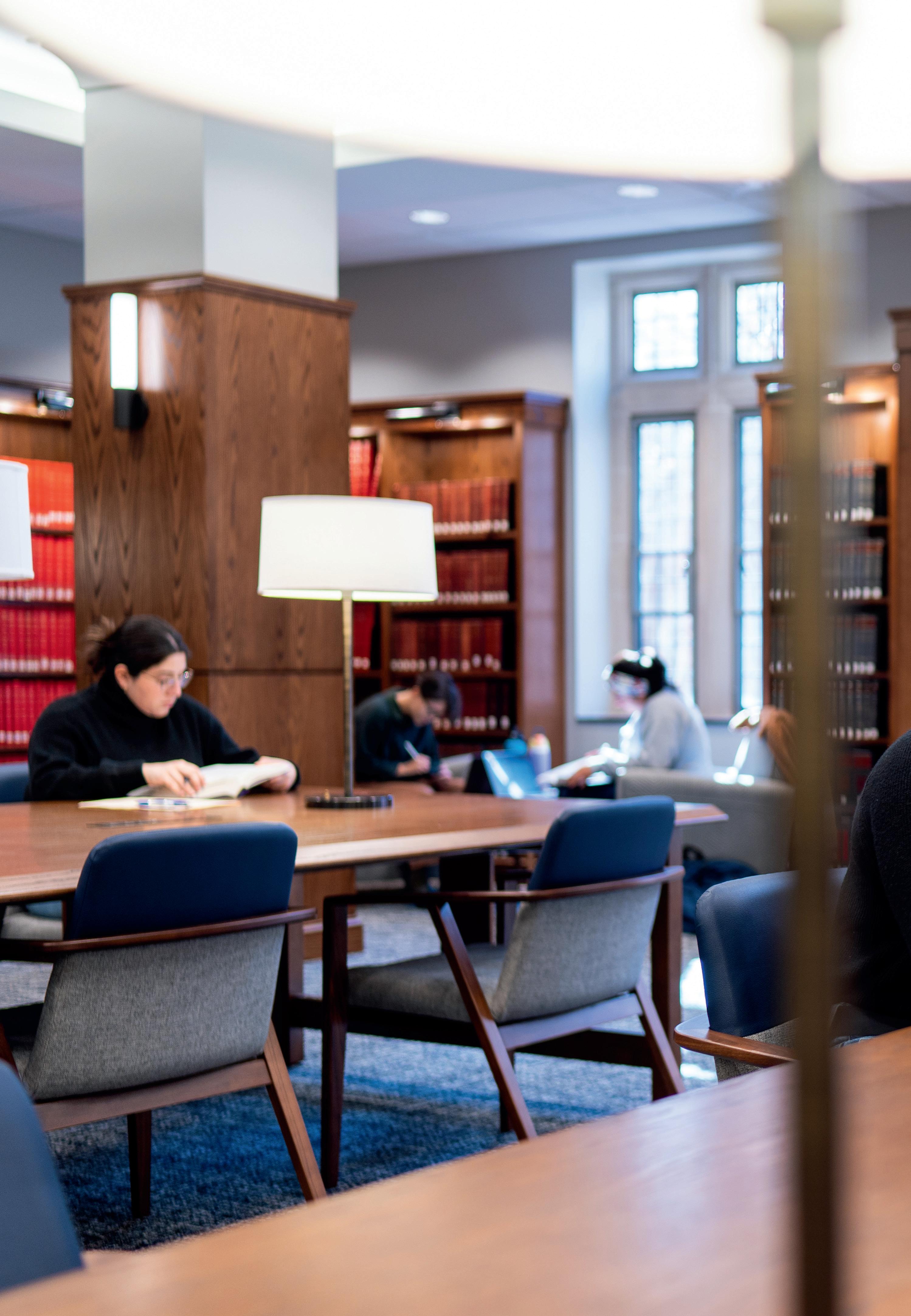
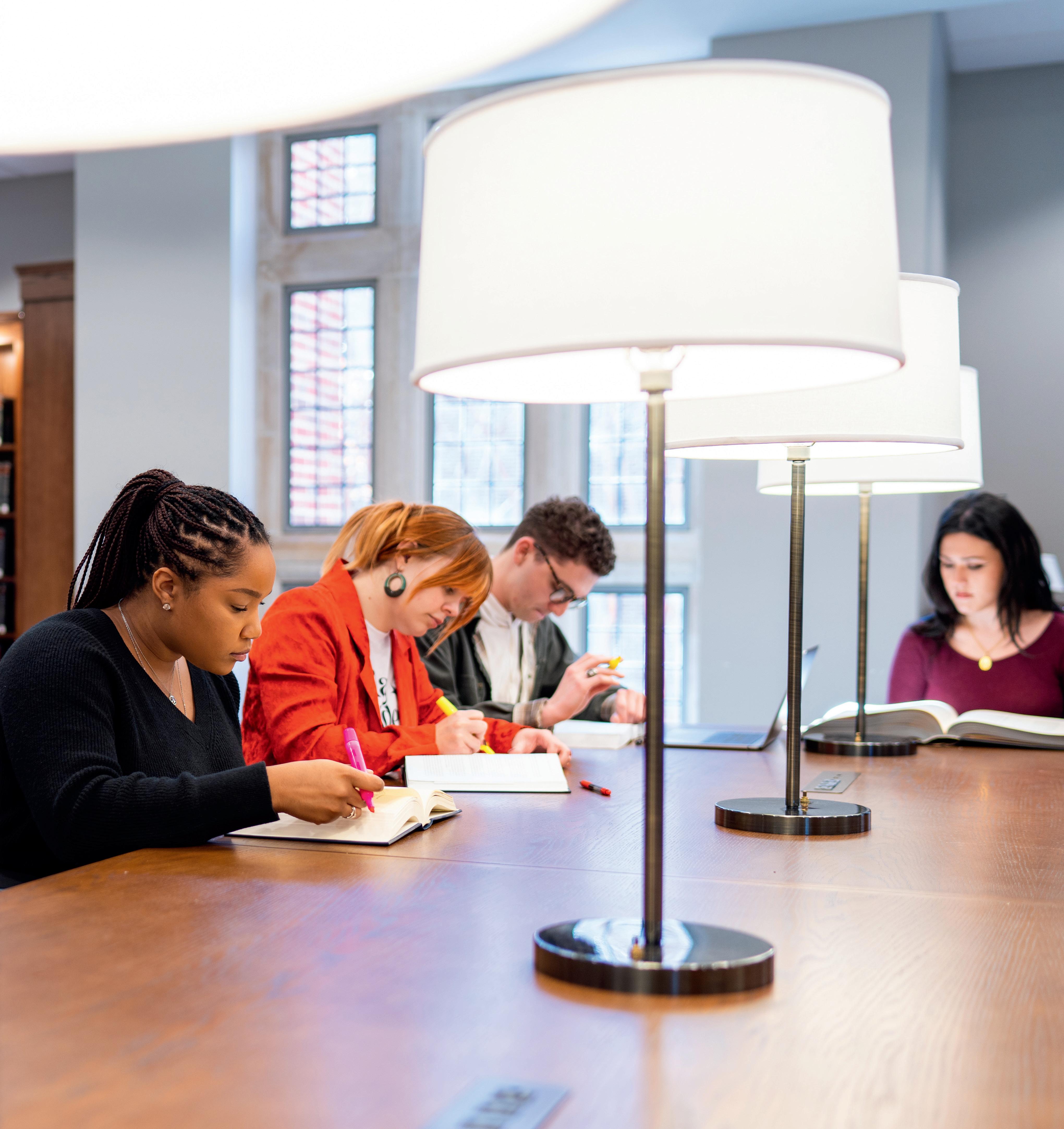
Making progress toward becoming better is an important part of thriving, and we’ve come a long way at Richmond Law.
One hundred years ago this fall, Jane Brown Ranson became the first woman to graduate from Richmond Law. By contrast, 60% of this year’s entering class of 2025 were women. We’re excited to tell the story of Ranson, a trailblazer who created a path for many women to follow and progress toward their goals.
As with Ranson, sometimes progress looks like breaking through barriers and blazing a trail. Other times, it shows up in the form of providing help to those in need. In these pages, you’ll hear from four of our alumni who are doing just that — using pro bono service to walk alongside members of their communities who need their help to make progress.
And progress is never without its challenges. Professor Hank Chambers discusses the “independent state legislature doctrine,” the legal theory at issue in the pending U.S. Supreme Court case Moore v. Harper. Depending on the court’s ruling, state legislatures could be given unfettered authority to control congressional elections and potentially dilute the power of voters, reversing a two-century trend.
Richmond Law is committed to providing students with the tools they need to continue making progress — whether it’s creating a pathway for others by forming a new student organization, helping within the community through a Carrico Center for Pro Bono Service project, or pursuing a career in public service thanks to a Bridge to Practice fellowship.
Legal education is about more than teaching students the law. It’s important to also give them the tools needed to make society better. We’re doing that here. And I’m excited about the progress we’ve made.
Best, Wendy C. Perdue Dean and Professor of Law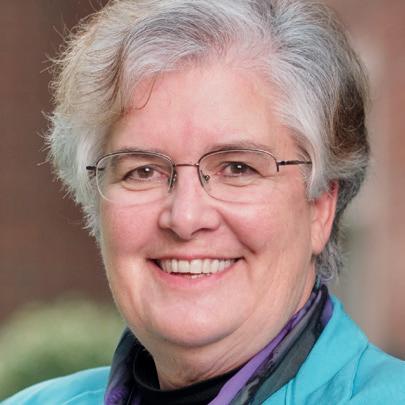
Professor Hank Chambers writes that the independent state legislature doctrine could reverse 200 years of progress and take power away from the people.
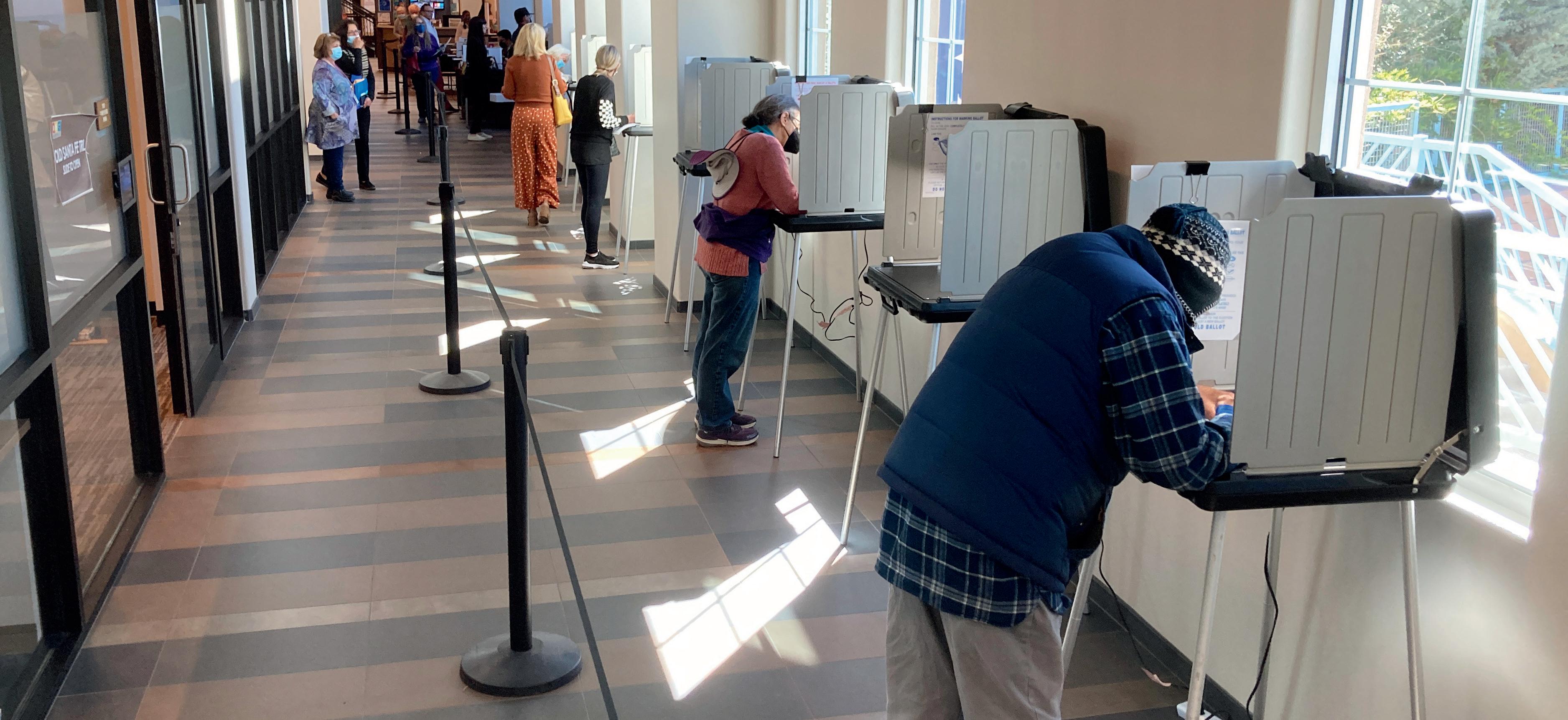
Spiders celebrated for their volunteerism share advice about working pro bono.
Jane Brown Ranson, Class of 1923, broke new ground when she became Richmond Law’s first female graduate. A century later, another woman graduate is at the heart of a milestone for the school.
Students monitor human rights at the 2022 World Cup Meet Jesse Cooper, L’23, president of the Mindfulness in Law Society
Q&A with 1 L newlyweds Ashley Fine, L’25, and Nathan Crispo, L’25
The path to legal academia wasn’t straightforward for Jessica Erickson, professor and director of the Richmond Law and Business Forum.
Rachael Deane, L’10
Kathryn “Kate” Dachille, L’13
REAL-WORLD EDUCATION
Richmond Law students volunteered as human rights observers at the 2022 FIFA World Cup in Qatar. From left, Amanuel Mekonnen, Viktoriia Martynov, Professor Andy Spalding, and Dilwyn Piner.

As Qatar took the world stage as host of the FIFA World Cup last year, three Richmond Law students had a frontrow seat to the action in Doha, providing a watchful eye to ensure that the human rights of those in attendance were protected.
Viktoriia Martynov, Amanuel Mekonnen, and Dilwyn Piner — all 3Ls at Richmond Law — traveled with Professor Andy Spalding, Jennifer & Samuel Tarry Research Scholar, to Qatar to serve as designated human rights observers. A collaboration between the Centre for Sport and Human Rights and FIFA, the program provides realtime human rights due diligence during sporting events.
“In law school, we aim to immerse students in the theory of the law and then introduce them to practice,” Spalding said. “Serving as a designated human rights observer at the World Cup marks the intersection of theory and practice, with the added elements of experiencing global culture and the pure exhilaration of international sport.”

Throughout the tournament, volunteers were deployed around official event venues to conduct human rights risk assessments through one-on-one interviews and observations at higher-risk locations and to assist attendees with raising complaints and accessing formal grievance mechanisms.
Volunteers completed an initial training program that equipped them to identify human rights impacts from a people-centered perspective, paying particular attention to potential vulnerabilities.
“This was a unique opportunity for our students to see how events they have always observed and enjoyed, even recreationally, are themselves shaped by law,” Spalding said. “Law permeates so many aspects of our social interactions, and in Qatar, they saw international laws, standards, and best practices collide with a distinctive culture in a most dynamic way.”
Despite criticisms surrounding Qatar being selected as the World Cup’s host country, including allegations of human rights abuses, Spalding believes this experience brings particular value to the students who participated.
“Most commentators on the World Cup being hosted in Qatar capture only select elements of this interaction, failing to appreciate so much nuance and richness,” he said. “These students had the opportunity to see beyond the superficial press coverage and sensationalistic reports and observe for themselves the complex relationship between megasports and human rights.”
Virginia’s legal landscape abounds with Richmond Law alumni in leadership positions. Currently, two Spiders lead the commonwealth’s two most prominent bar associations.
In June 2022, Stephanie Grana, W’90 and L’93, of Cantor Grana Buckner Bucci became president of the Virginia State Bar, the state’s licensing body for Virginia lawyers and judges. Grana made history as the organization’s first Hispanic president. Her term runs through July 1.
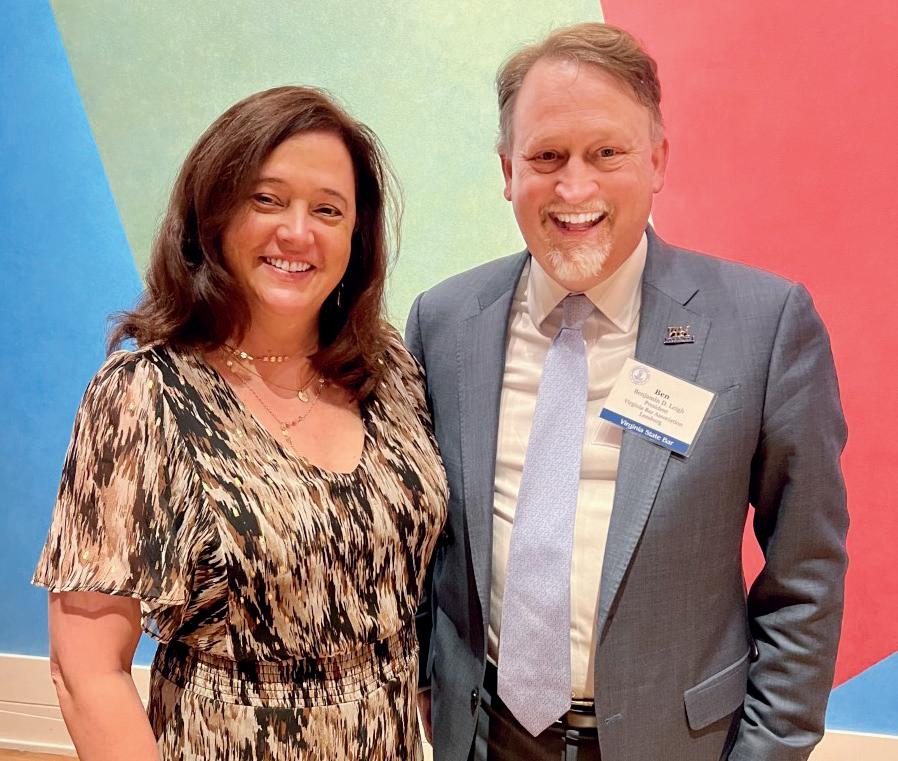
In January, Benjamin Leigh, R’91 and L’96, of Troxell & Leigh became president of the Virginia Bar Association, the commonwealth’s largest statewide voluntary bar organization. His term lasts one year.
“Ben and I are citizen lawyers,”

ADMISSION
Grana said. “We practice law and serve our clients, but we also choose to serve the legal community and the public at large.”
“The mutual respect from our Richmond background serves both our organizations well,” Leigh agreed. “It is a very special thing.”
Law school rankings by U.S. News and World Report are in the spotlight. More than 40 law schools have announced they will no longer submit data to U.S. News. Several medical schools and at least one undergraduate college have followed suit.
Criticism of the rankings was reinforced by U.S. Secretary of Education Miguel Cardona at a recent conference to discuss student needs for information about the law schools.
“We need a culture change,” he said, adding that a focus on selectivity has helped steer underserved students to lower-tier institutions.
In response to the criticisms, U.S. News announced it would change its methodology. However, the changes do not address the core issue that a single ordinal ranking cannot capture the variety of strengths and characteristics that prospective students may value.
For example, Richmond Law is an excellent choice for aspiring lawyers
interested in state or local clerkships. The Princeton Review lists it at No. 9 in the nation for those seeking local jobs within the judiciary. Similarly, National Jurist says Richmond Law is one of the top 30 law schools for producing “Super Lawyers” and “Rising Stars.” Fewer than 5% of lawyers from each state earn this honor annually.
U.S. News plans to release its newest law school rankings in mid-April. Given the change in methodology, there will certainly be changes — in some cases significant ones — in where schools rank.
As scrutiny of U.S. News rankings continues, these numbers may become less important in the conversation about law schools.
“Rankings have created an unhealthy obsession with selectivity,” Cardona said. “It’s time to focus on what truly matters: delivering value and upward mobility.”


When media cover news and events, they come to Richmond Law for expertise and perspective. Here’s a sample of recent stories that featured experts from Richmond Law.
JULIE MCCONNELL, director of the Children’s Defense Clinic, commented on the arrest of a 6-year-old in connection with the classroom shooting of a Virginia teacher. A criminal trial for the child is “extremely unlikely” because defendants must be competent to stand trial, she said. “It’s very possible that a 6-year-old wouldn’t understand that [a gun] is not a toy.”

Professor CARL TOBIAS contrasted unrest in Brasilia, Brazil, in January with the violence at the U.S. Capitol on Jan. 6, 2021. The U.S. attack “went right to the heart of the changing government,” while the Brazilian attack is not “as heavily weighted with that kind of symbolism,” he said.
Professor HANK CHAMBERS commented on the investigatory powers of Virginia’s inspector general in a story about the state’s response to a murder and kidnapping in California by a former state trooper in Virginia. The statute that created the IG’s office “is fuzzy enough so that the IG might be able to investigate general issues that the governor asks the IG to investigate,” he said.
Professor REBECCA CROOTOF was a respondent to the publication’s “The Future in 5 Questions” series. Her Q&A focused on law and liability related to artificial intelligence, including in armed conflict. When asked to identify an overhyped technology, she replied, “Military AI in general ... The more I’ve worked on [autonomous weapons systems] and studied them and learned about them, the more I think they are overhyped.”
Richmond Law’s Legal Business Design Hub got nods for innovation from Bloomberg Law and Fast Company magazine. The hub teaches students the skills and entrepreneurial mindset of business design as it applies to organizations and teams that deliver legal services. Its goal is for students to “view themselves as future legal service entrepreneurs, not just as future traditional lawyers,” said Josh Kubicki, the hub’s director and an assistant professor.
Bloomberg Law included the hub on its list of “Top 10 Law School Innovators” alongside programs at the law schools of Penn, Northwestern, Villanova, and others “based on the criteria of innovation, impact on students, ability to advance the legal industry, and replicability.”
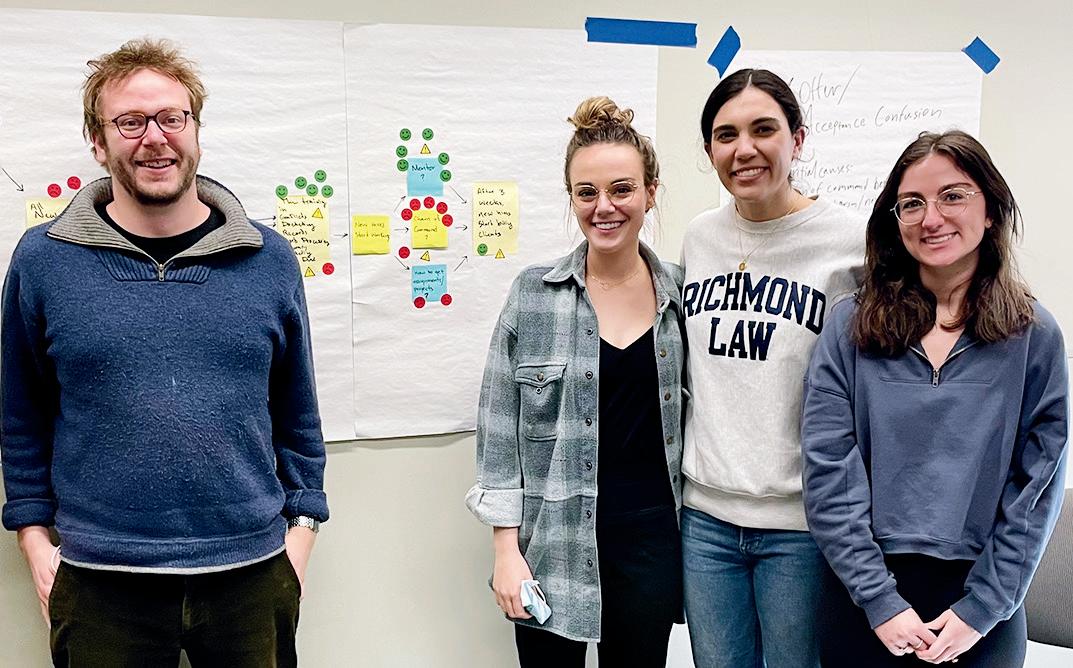
Fast Company named it the winner of the “Learning” category of its 2022 Innovation by Design Awards. The awards “represent an alternative to the ‘What’s next?’ design strategy, trading short-term solutionism for long-term, considered thinking,” the publication wrote.
Richmond Law’s Julie McConnell recently received Virginia’s top honor for faculty at the state’s public and private colleges and universities. In December, the State Council of Higher Education for Virginia named McConnell a recipient of its 2023 Outstanding Faculty Award. McConnell, director of the Children’s Defense Clinic, was one of only two law professors among 12 recipients chosen from 74 nominees representing colleges and universities across the commonwealth.
Tundun Oladipo, L’24, and Brittany Guempel, L’24, won first place in the National Veterans Law Moot Court Competition in Washington, D.C.
“I just couldn’t be prouder of Tundun and Brittany,” said adjunct professor Thomas J. Herthel, who coached the team. “They worked incredibly hard, preparing in excess of 90 hours, and brought the kind of dedication needed to really succeed.”
This year’s case focused on whether a veteran who sustained an injury while participating in an extracredit activity related to a Veterans Affairs education and job training program should receive disability
compensation.
Oladipo and Guempel beat out 29 teams representing 26 law schools, the largest field in the competition’s history. This significant accomplishment is even more impressive because the two 2L students were up against a field of mostly 3Ls, many of whom have previously competed in this and other national moot court competitions.

Vieng Siklar, appeals director at the Virginia Department of Veterans Services, and Stacy Tromble, director of court of appeals litigation at the National Veterans Legal Services Program, also coached the team.
Richmond Law’s newest student organization moves the school one step closer to its goal of creating a greater sense of belonging for all students. The Latin American and Hispanic Law Organization, or LAHLO, launched in the fall and seeks to bring together the various Latin American and Hispanic groups within Richmond Law and to support and promote Latin American identity and culture throughout the community.
“Creating LAHLO was important to me because I wanted to strengthen
the Latin American and Hispanic community here on our campus,” said Kiara Anguiano, L’25, inaugural president of the organization. “Introducing this new layer of presence helps to expand the diversity and inclusive energy on our campus and Richmond as a whole.”
“We are pleased to support this student initiative that reinforces and strengthens our efforts to make the school more inclusive and one in which everyone can have a strong sense of belonging,” said Wendy Perdue, dean.
HOW DID YOU MEET, AND WHEN DID YOU KNOW YOU WANTED TO GET MARRIED?
Nathan: At our undergraduate, the University of Utah, we met at a pre-orientation program. We didn’t start dating until the next semester though. [By Ashley’s graduation], we had been together for a really long time. That’s when it came down to like, “Hey, we’re kind of adults now. We’re at that point in life where you got to make that decision.” And I realized that I did in fact want to marry Ashley.
HOW DO YOU NAVIGATE BEING NEWLYWEDS AND LAW STUDENTS? ARE THERE EXTRA CHALLENGES OR BENEFITS?
Ashley: I feel like we’re so good about pushing each other to improve. I’m always, “Why wouldn’t you apply to that? Go apply to that opportunity. You shouldn’t count yourself out.” And I think it’s really great to have a sounding board with him because he is with me in this process.
N: There’s a lot of studying, and we don’t follow the same kind of study schedule. I might be like, “Hey, let’s go do something.” And she’s like, “No, I’m busy.”
WHY DID YOU CHOOSE TO STUDY LAW? WHAT AREA ARE YOU INTERESTED IN?

N: With a criminology degree, you have more or less two career paths. You can go for law, or you can be in law enforcement. If I was going to go for law enforcement, that would mean signing a mobility agreement. And Ashley always wanted to go to law school. That means we’d either have to be long distance for indefinite periods of time or drag her with
me everywhere I went. That wasn’t really going to work with a legal career. So that was what made me realize I really should go for law school.
A: My family owns a family busi ness, and so I’ve grown up from a young age knowing the impor tance of a contract and the legality of how businesses operate. I think for me, I’m very interested in how busi nesses work, and I’m interested in the legal side of that. The other thing I’m really pas sionate about is making workflows more efficient.
WHAT ARE YOUR FUTURE PLANS FOR MARRIAGE AND YOUR CAREERS?
A: I think for right now we’ve been looking a lot at summer internships [and marriage-wise] just continu ing to push on and motivate each other.
N: Future plans for the marriage, step one: Stay mar ried. In terms of career, I’m really just going to see where the winds take me.
LAWFULLY WEDDED STUDENT LIFE L students Ashley Fine and Nathan Crispo married in July 2022 in Utah. According to university records, there are currently 284 Spider Law alumni married couples.
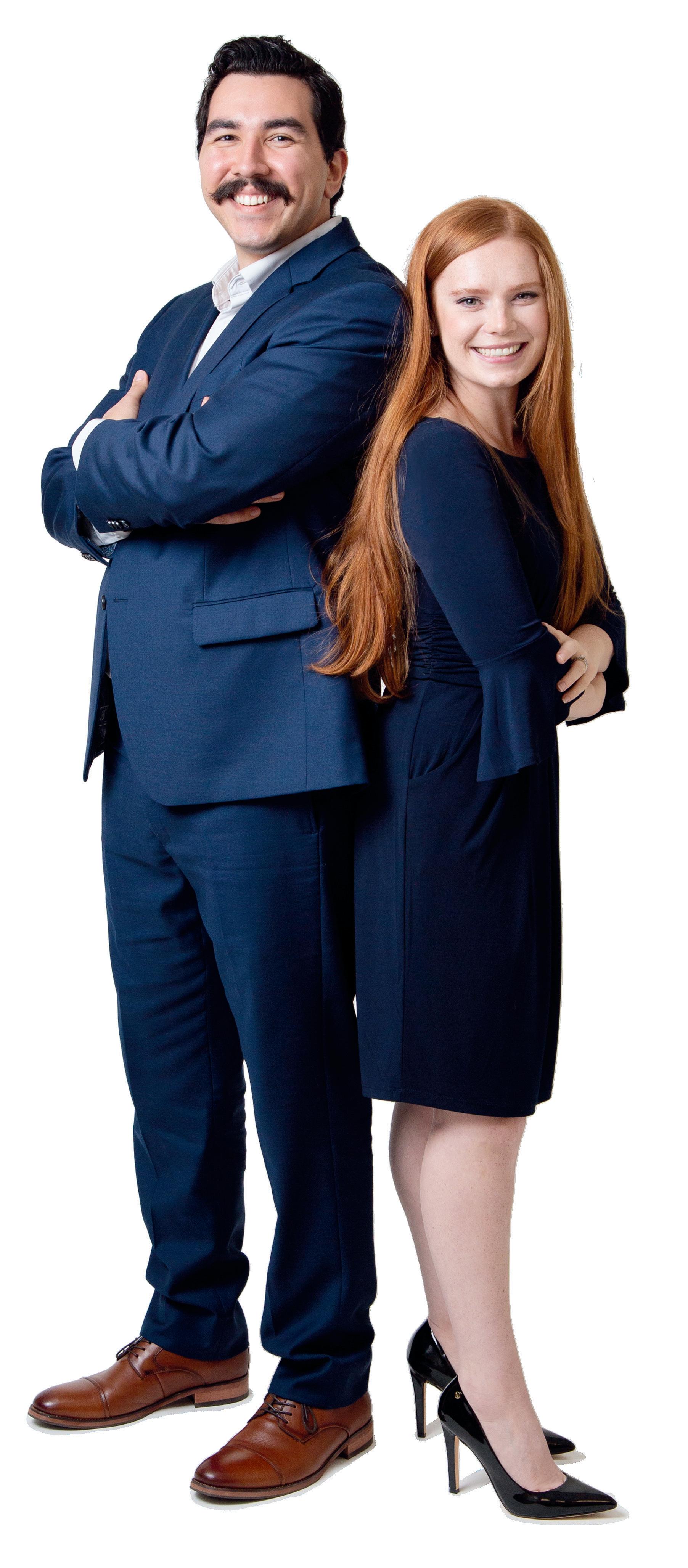
Discussions about mental well-being and work-life balance have become increasingly common, and their importance is no exception while in law school. Jesse Cooper, L’23, says that the practice of mindfulness — implementing purposeful habits that allow for mental rest and restoration — is a key component of maintaining well-being while in law school.

“Mindfulness looks different for different people,” said Cooper, president of Richmond Law’s Mindfulness in Law Society. “For some it’s meditation, breathing exercises, or yoga. For others, maybe it’s sitting on a bench and watching birds sing or taking a relaxing hot bath at the end of a long week. It’s all about setting aside time to recharge your mental batteries.”
Practicing mindfulness is helpful for managing anxiety and the competing priorities students often experience in law school, she said.
“During a time like this, where students are being pulled in so many directions at once, it’s so incredibly refreshing to take a step back and focus on one thing, like breathing. If you’re lucky, maybe you can focus on nothing for a few moments,” she said. “Opportunities like this can help prevent burnout and help students gain a better perspective of their larger place in the world.”
Implementing her own mindfulness practice has benefited Cooper during her time at Richmond Law. “Mindfulness has helped me navigate law school in a sustainable way, especially in times where I started to feel stressed out,” she said. “Having space to step back from it all has helped me re-center myself and realize there is more to life than just school and work.”
Taking practical steps can help those new to the idea of mindfulness, according to Cooper.
“People should schedule downtime like they would an assignment,” she said. “Even if it’s just five minutes every day of not looking at your phone, thinking about school, or talking with others about it. Five minutes may not seem like a significant period of time, but the relief it provides for your mind can have effects that last all day.”
As with any new habit, the key to making a lasting impact is to make incremental changes and to not get discouraged if there are setbacks. “Mindfulness is a journey and not a destination,” Cooper said. “Every little bit counts.”
Ultimately, implementing mindfulness habits while in law school will serve students far into their careers. “It’s important for students to take care of themselves now so they can continue taking care of others,” Cooper said.
Two Richmond Law alumni joined the federal bench in 2022.
In May, the U.S. Senate confirmed Elizabeth Hanes, ’00 and L’07, (left) to serve as a U.S. District Court judge for the Eastern District of Virginia. In December, it confirmed Kelley Hodge, L’96, (right) to serve on the U.S. District Court for the Eastern District of Pennsylvania.
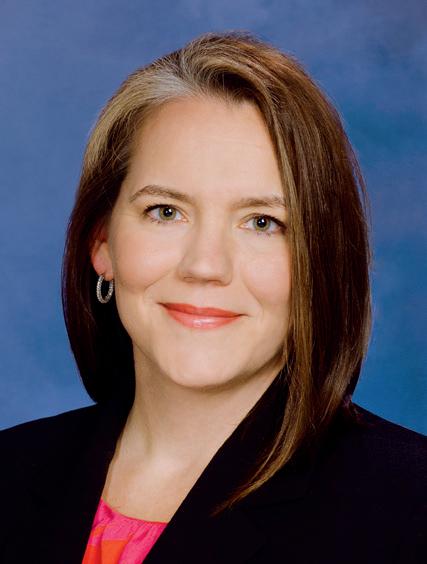
Hanes was a public defender in Richmond before working at a law firm. Hodge was Philadelphia’s first African American female district attorney and has experience in pri-
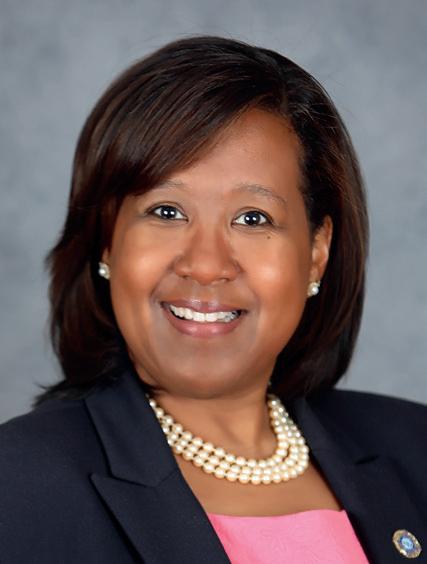
SPIDER FAMILY
vate practice and higher education.
“I’m so proud of these two alumnae who continue Richmond Law’s long tradition of service in the judiciary,” said Wendy Perdue, dean.
MuseKids Storytime has brought a new version of “take your kid to work day” to the law library. Programming includes whimsical songs and lawthemed children’s stories about Ruth Bader Ginsburg and Sonia Sotomayor for young children.
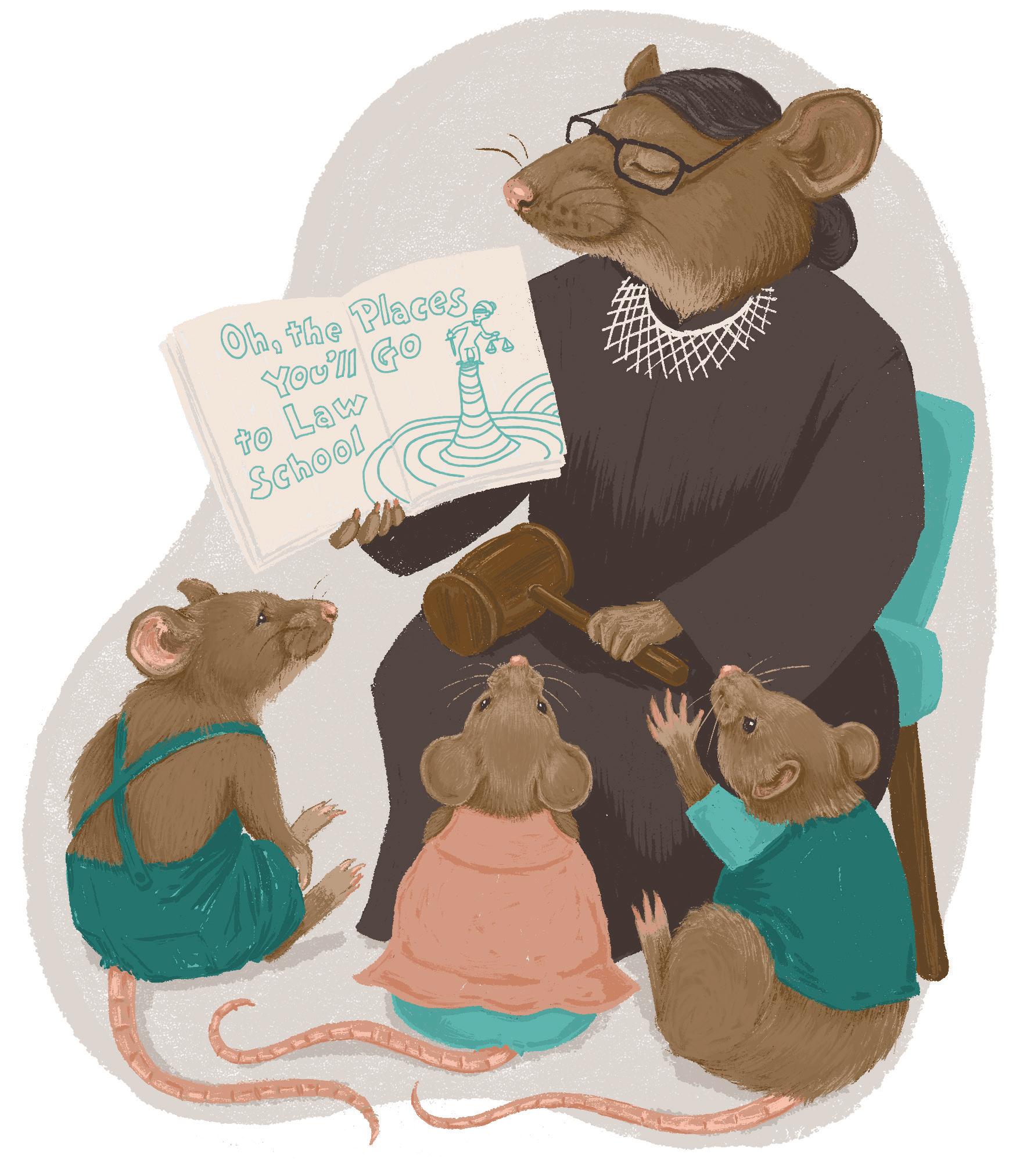
The program is a partnership between Muse Law Library and UR PALS, the Parents and Allies Law Society. PALS — an organization of law students with children, plus allies — formed as a resource for creating opportunities for quality family time while juggling the demands of law school.
The partnership is a way to “marry both of those worlds together, being students and being parents,” said Anika Rogers, PALS president. “We spend so much time with one another, [so] it’s nice to see where we can relate on a different level and just on a parental or human level beyond the classroom.”
Children get to create friendships with playmates in the same situation, meet their parents’ classmates, and learn about law. Student-parents can spend time with their families. Best of all, it may inspire the next generation of lawyers. —Amy Ogle, ’26
Nearly 100 alumni, families, and friends returned to campus in February for the inaugural dinner of the Black Law Alumni Association, Richmond Law’s newest organization that provides a forum for students and alumni to network and connect.
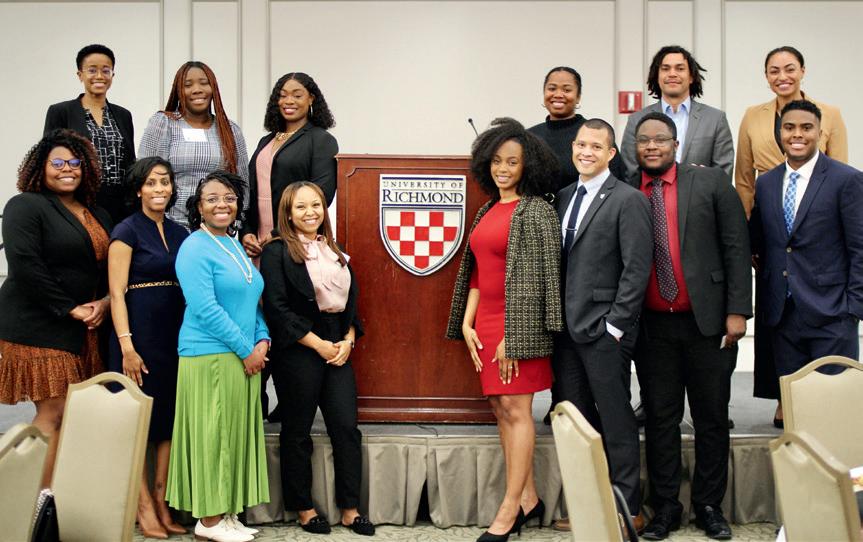
“I hope the BLAA is a source of meaningful connection and inspiration for you,” Kevin F. Hallock, the university’s president, said in his address to attendees. “And I know that you will strengthen our university’s academic excellence as you engage with our students, enrich their law school experience, and invest in our future.”
Wendell Taylor, L’98, a current university trustee, also spoke, discussing his years as a student at Richmond Law and how the connections he made then influenced his current success as a managing partner of the Hunton Andrews Kurth office in Washington, D.C. He said that making connections will be a focus of the BLAA.
“The connections I’ve made through Richmond Law have been instrumental in my career, and it is my duty, but also my honor and privilege, to pay it forward,” he said.
He also offered advice for the students at the dinner. “I’ve only had two employers, and Richmond Law deserves much of the credit for helping me get both,” he said. “So, to the law students in attendance: Make connections tonight and stay connected to them. Those connections will be instrumental in your legal careers. The fact that you attended this event tonight shows that you get it.”
Richmond Law Spiders have been spotted enriching their professional and personal lives. Find more via @URLawSchool social media and hashtag #lawspiderspotting.
Bhakti Raval, L’24, Zie Medrano, L’23, and Kyara Rivera, L’24, spent their summer at Troutman Pepper. Raval and Rivera will also spend summer 2023 there, while Medrano will join the firm in the fall as an associate.

Richmond Law students and undergraduate students in the university’s Jepson School of Leadership Studies visited the Royal Courts of Justice in London as part of the annual Cambridge Summer Program. Faculty members W. Clark Williams (far left), Laura Webb (front row, fourth from left), and Andy Spalding (far right) joined them.
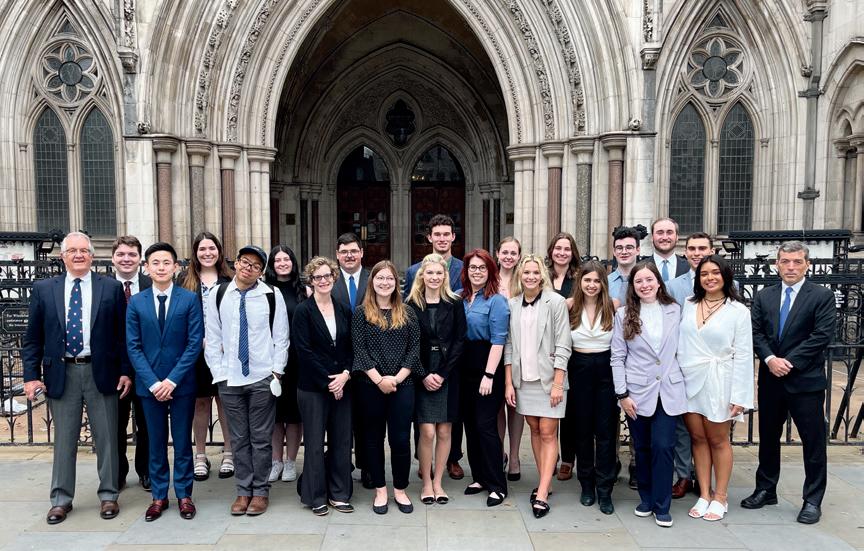
SYMPOSIUM Issues related to domestic violence were the focus of the Public Interest Law Review’s annual symposium in February. Sarah Jane Brubaker, professor of gender violence intervention at Virginia Commonwealth University, was keynote speaker for the event.
Court cases, including New York State Rifle & Pistol Association v. Bruen and Dobbs v. Jackson Women’s Health Organization, on domestic violence.
Elizabeth Stalfort, L’24, and Karl Canby, L’24, used some of their summer in 2022 to visit historic Machu Picchu.

“We need to try to change laws in ways that recognize and respond to the overlooked harms that are experienced,” she said. “And our response also requires that we do so in trauma-informed and survivor-centered ways.”
Other speakers examined the potential impact of recent Supreme
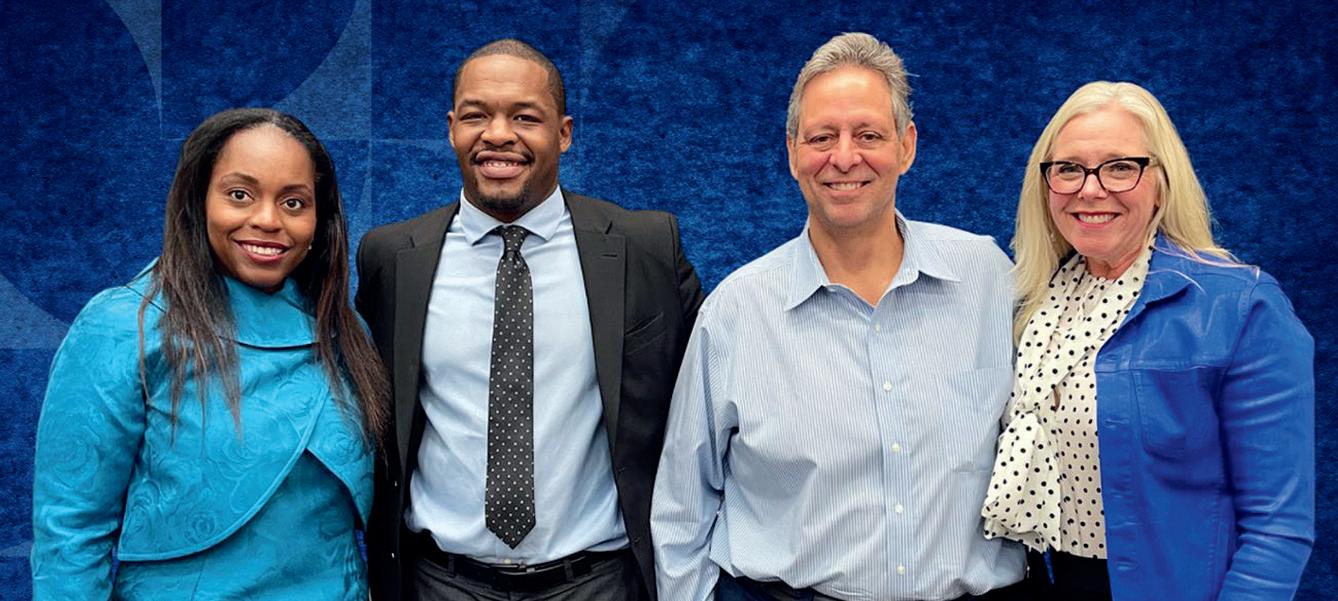
“Domestic violence is a complex topic,” said Wendy Perdue, dean. “Solutions are not simple in this area, and there are likely to be a number of good faith disagreements about the best path forward. But our best hope for progress comes from serious discussions like those taking place in forums like the PILR symposium.”
PILR is the law school’s scholarly voice for issues pertaining to social welfare, public policy, and a broad spectrum of jurisprudence.
Richmond Law has launched a new forum to help students explore careers in criminal justice. A cornerstone of the new program — called the Richmond Criminal Justice Forum — is its speaker series. The first panel discussion featured Mychael Jefferson-Reese, ’00, chief public defender for the Chesterfield County Public Defender’s Office, and Shannon Taylor, L’95, commonwealth’s attorney for the County of Henrico. They discussed their paths to their current positions, the challenges they face, and job satisfaction. Amari Harris, L’13, head of diversity
and recruiting at the Virginia Indigent Defense Commission, moderated the discussion.
“Public defense is the modern-day civil rights movement,” JeffersonReese said. “This is how we effectuate the most change to make our world a better place — by going to the court day in and day out and fighting for our clients.”
To learn more, contact visiting professor Dave Johnson, L’83, retired executive director of the Virginia Indigent Defense Commission, at djohnso7@richmond.edu.
‘Solutions
IN BRIEF This spring, Ann M. Eisenberg, a professor at the University of South Carolina School of Law, gave the opening lecture at University of Richmond Law Review’s annual symposium. Her talk was titled “Rural America as a Commons.” The following is a lightly edited excerpt.
We talk about rural decline as if it has been caused by forces of nature. We hear about globalization, automation, and improved efficiency as driving workers out of these areas and into cities. But I argue that each of the supposedly larger-than-life trends can always be traced back to policy choices — or the decision to refrain from making a policy intervention — and that those policy choices reflect subjective values that do not have to be accepted at face value.
For example, we talk about global ization as an irreversible thing that just happened. In fact, if we look back to the ’90s and beyond, there were widespread social movements of workers and residents fighting for their jobs and for their towns. The federal government told them it was all going to be OK and then entered into arrangements like the North American Free Trade Agreement, resulting in mass plant closures, layoffs, and displacement. Congress did also pass some protections for workers and establish trade adjustment assistance, but it seems safe to say that globalization was a substantial blow to the rural economy that was made by deci sion makers acting with agency.
Another piece of legal history that often goes missing is the legal history of transportation. There was a series of decisions over the ’70s, ’80s, and ’90s to stop requiring that common carriers to provide equitable, affordable ser vice to rural communities. This, of course, meant service provid ers would subsequently engage in large-scale abandonment of rural
regions, which helped contribute to rural isolation, a harder quality of life, and socioeconomic stagnation.
I say this to establish a couple of premises. Premise No. 1 is that the rural economy and way of life haven’t been dying; they’ve been actively undermined by a series of intentional policy decisions. Premise No. 2 is that this experiment in undermining and neglecting rural communities with the tacit or explicit hope that everyone in struggling regions will just leave hasn’t worked or worked out well for us as a society. I call this approach the Wasting of Rural America.
I’ve been exploring the arguments in support of more aggressive public interventions to try to change course

urgent than both of these two arguments, and that’s the argument that our society and federal government need to intervene more aggressively to reshape the rural economy to ensure that we are able to survive climate change, in addition to tackling other pressing crises.
The idea that American society collectively needs rural regions and residents and workers to survive really complicates the idea that urbanization is benign, inevitable, and the way of the future. I argue that it offers helpful guidance to reconceptualize rural America as a commons. The idea is that rural America — and not just the natural resources in it — can be reconceptualized holistically as something we all need and need
«
SOURCE
Eisenberg delivered her comments Feb. 17 at “Overlooked America: Addressing Legal Issues Facing Rural United States,” the 2023 symposium hosted by University of Richmond Law Review
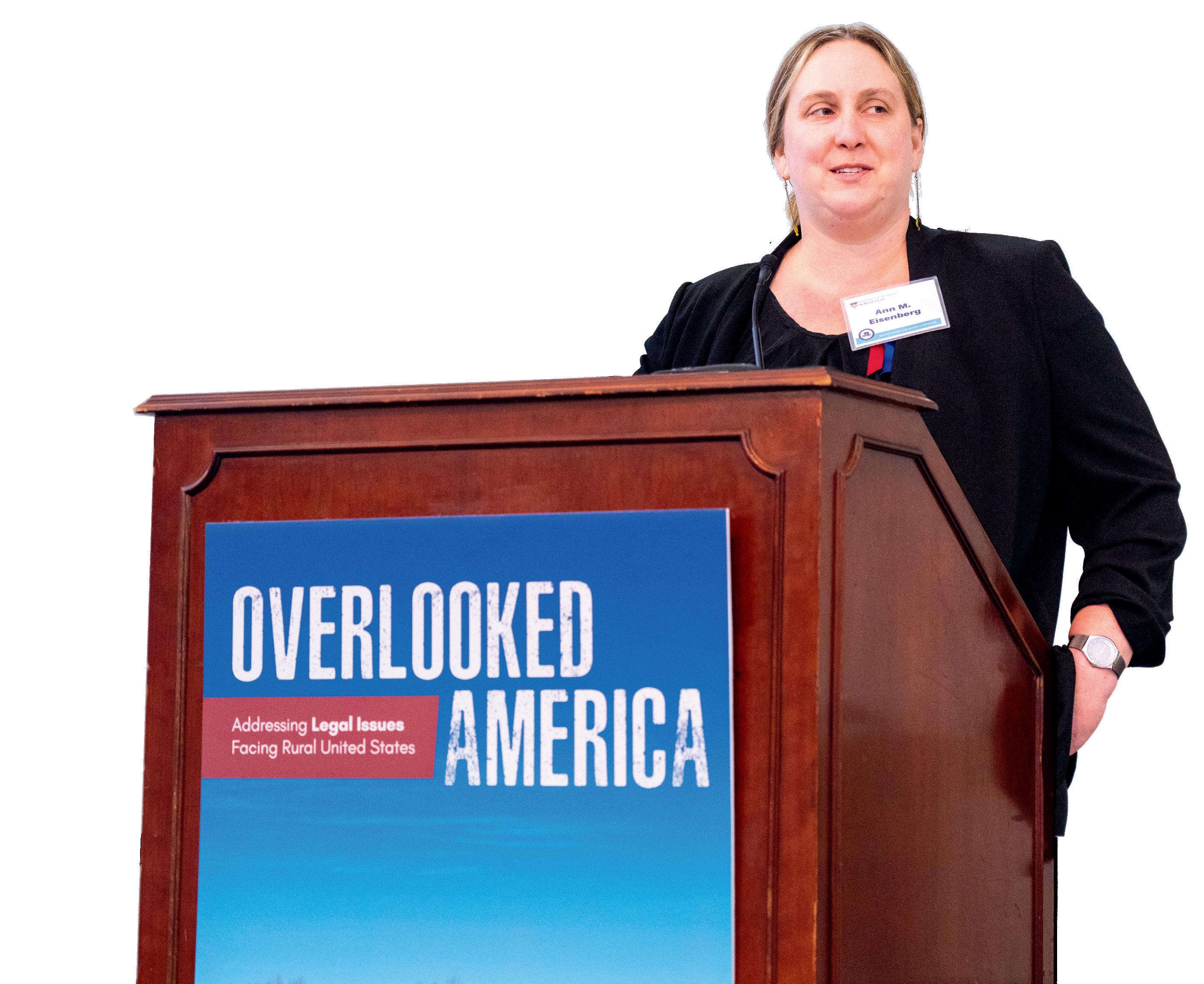
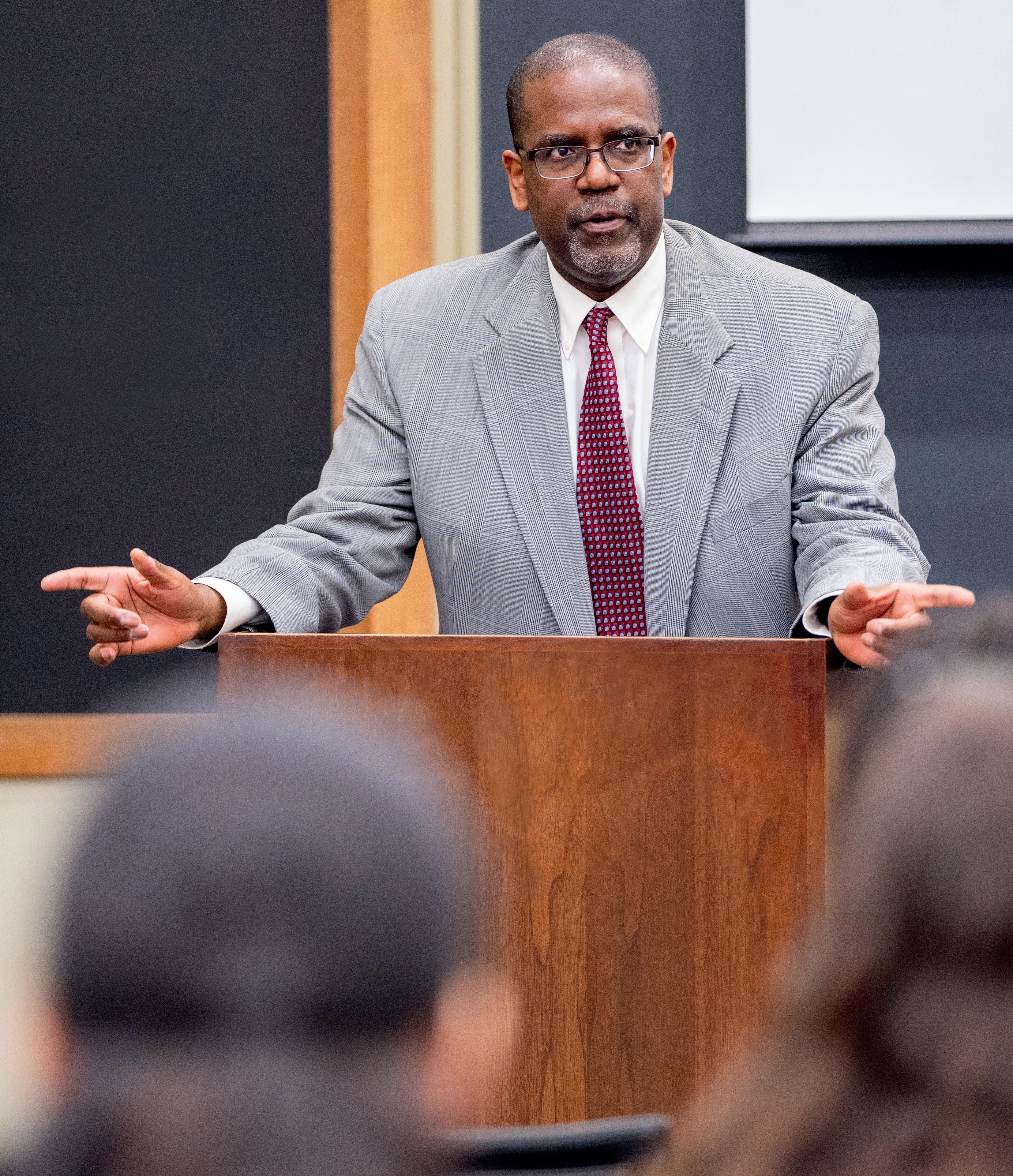
In a case heard on Dec. 7, 2022, Moore v. Harper, the U.S. Supreme Court could decide that state legislatures have control over congressional elections, including the ability to draw voting districts for partisan political advantage, unconstrained by state law or state constitutions.
At issue is a legal theory called the “independent state legislature doctrine,” which is posed through the court’s consideration of a dispute over gerrymandered North Carolina congressional districts. In early 2022, North Carolina state courts found the legislature violated the state constitution when it drew gerrymandered congressional districts favoring Republicans. The legislature has claimed that the U.S. Constitution gives it authority, unfettered by state courts’ interpretation of the state constitution or laws, to regulate congressional elections, and is asking the Supreme Court to agree.
If the court agrees, it could free state legislatures to take power away from voters — “We the People” in constitutional parlance — and reverse a two-century trend toward expanding the power of the people in congressional elections.
Some election and constitutional law analysts have already suggested that state legislatures may have similar power over presidential elections. The U.S. Constitution allows state legislatures to determine how a state chooses its presidential electors, arguably leaving the legislature free to choose presidential electors on their own without a popular election.
The people wielded little power in congressional elections at America’s founding.
The unamended Constitution required United States senators be chosen directly by their state legislatures, not by voters directly. That was the case until the 17th Amendment was ratified in 1913, which requires U.S. senators to be elected by the people.
The Constitution has always required United States representatives be chosen by the people, but who could vote was severely limited.
America’s late-18th century vision of democracy treated voting as a privilege to be doled out by the state, not a right. Voting was typically limited to a narrow band of people — adult white men with property.
Some states, including North Carolina and New Jersey, allowed women or free Black men, or both, to vote in the late 18th and early 19th centuries. Nonetheless, who could exercise power in congressional or state elections was a matter of grace provided by state legislatures.
As U.S. democracy matured, the people gained power as the electorate expanded through various constitutional amendments.
Voting remains a right provided by each state. However, the states can no longer limit the right to vote based on race, sex, failure to pay a poll tax or age if a voter is 18 years or older. Functionally, adult citizens who have not been convicted of a crime have the right to vote in federal and state elections.
This essay was first published by the nonprofit independent news organization The Conversation and was distributed by the Associated Press. It appeared in nearly 50 additional print and online publications from New Hampshire to Hawaii.
In addition, the value of a vote is protected. In the 1960s, the Supreme Court recognized the one-person, one-vote doctrine under the Constitution. That doctrine requires each congressional district in a state to contain approximately the same number of residents.

Before the doctrine was recognized, one congressional district in a state could have several times the population as another district in the same state. A vote in the larger district would have a fraction of the power of a vote in the smaller district.
In the wake of the one-person, one-vote doctrine, each vote carries approximately the same weight.
Providing voting power to the people makes representatives more accountable and answerable to their constituents. Adopting the independent state legislature doctrine may reverse the accountability.
Those who advocate the legitimacy of this doctrine say it rests on the Constitution’s grant to state legislatures of regulatory power over congressional elections in Article I, Section 4.
That section reads: “The Times, Places and Manner of holding Elections for Senators and Representatives, shall
be prescribed in each State by the Legislature thereof; but the Congress may at any time by Law make or alter such Regulations.” It gives state legislatures the primary authority to run congressional elections, subject to congressional regulation through federal law.
For example, for much of the nation’s history, states could choose U.S. representatives through districts or through an at-large system. However, federal law now requires the representatives to be chosen solely through districts.
In addition, state legislative power has been treated as though it is constrained by other state governmental actors. In many states, governors may veto redistricting maps they deem unfair or improper. Similarly, as in the North Carolina case, courts may deem such maps unlawful or unconstitutional. A strong version of the doctrine might give a state legislature the power to draw congressional districts without any oversight from state courts or the governor. Given that state courts apply a state’s constitution and state statutory law, a strong independent state legislature doctrine could leave the state legislature unfettered by state law in this area.
However, in a well-functioning democracy, state constitutional and statutory law should reflect the preferences of a state’s people. The Supreme Court reminded the
“STATE CONSTITUTIONAL AND STATUTORY LAW SHOULD REFLECT THE PREFERENCES OF A STATE’S PEOPLE.”Photograph by AP Photo/Morgan Lee
Arizona legislature of this point in a 2015 ruling that allowed a citizen initiative in that state to bypass the legislature in redistricting, instead requiring congressional districts to be drawn by an independent commission. If the independent state legislature doctrine were to be adopted by the current Supreme Court, that power could not be exercised by citizens.
If the court adopts the independent state legislature doctrine, legislatures would still be subject to regulation by the U.S. Constitution and by federal law, such as the Voting Rights Act.
However, the court has limited the protections embedded in the Voting Rights Act. In the 2019 ruling Rucho v. Common Cause, the Supreme Court deemed partisan gerrymandering a political question, not subject to regulation by the Constitution. In that ruling, the court noted that state constitutional and statutory law could be used to stop partisan gerrymandering.
Three years later, the court is set to hear a case that could remove state courts from oversight of partisan gerrymandering by state legislatures. Adoption of a strong independent state legislature doctrine would leave partisan gerrymandering unregulated at both the state and federal levels.
State legislatures, unconstrained by state law, could then create aggressively gerrymandered congressional districts, possibly leading to an ever more partisan Congress with accompanying gridlock and policy failures.
When the Constitution was ratified, the state legislature was the locus of state power. That power was exercised by a few men who were not answerable to the broad populace. The state legislature was responsible for acting in the citizenry’s best interests. However, the citizenry had no effective way to force legislators to act in the people’s interests.
Over time, citizens have gained more control over state legislatures through an expanded vote and by becoming a larger part of the lawmaking apparatus of many states.
In a 21st-century democracy, the constitutional grant of regulatory authority to a state legislature regarding congressional elections might be thought to be a grant of primary authority to a state legislature — but an authority subject to a variety of other limits imposed via state constitutional law, state statutory law, the courts, and the citizenry.
At America’s founding, the Constitution made the power of the people a matter of grace provided by state legislatures. As America’s democracy matured, the power of the people became a matter of right under the Constitution.
The independent state legislature doctrine threatens to make the power of the people a matter of grace again, reinstating an anachronistic vision of democracy long thought to have passed.
Proponents of the independent state legislature doctrine argue that there are areas in which state legislatures aren’t constrained by a state’s laws or constitution — and that regulating congressional elections is one of them. Are there examples of areas in which a lack of constraint is broadly accepted? I’m thinking, for example, of majority leadership in the U.S. House of Representatives selectively removing minority party members from committees in recent years. Not really. Legislatures are limited by constitutions — state and federal. If the Constitution is silent, the legislature is not limited. The mentioning of removing folks from committee — perfectly good point. The Constitution has very little to say about how Congress handles its internal business. If those rules, however, run afoul of other provisions of the Constitution, we would have an issue. So if Congress said, “We don’t allow any of our African American congresspeople to serve on any committees,” we may say, “Well, the Constitution has something to say about that.”
That’s separate from the independent legislature doctrine, which seems to suggest that on broader issues, a state legislature has the right to act on its own — doesn’t matter what the state constitution says, doesn’t matter what state law says; they can just act however they want.
What are the potential implications of the court agreeing with this doctrine?
It would be a hyperliteral interpretation of the Constitution. If we take Constitutional language — “The state legislature does X” — to suggest that means the legislature has the first and only word on how to do this particular thing, then there are any number of references that could be interpreted similarly. Who knows what the next thing would be? That’s the bigger issue because it says the legislature doesn’t have to look at the remainder of the law. That’s where things can get weird.
I know you’re not in the tea leaf-reading business, but an argument in favor of this doctrine might be appealing to the self-identified originalists on the court. But at the same time, it’s hard to imagine the Supreme Court taking the power of judicial review away from state courts. Do you have a sense of how this is likely to play out? With this court, you never know, but I think the key is that there are several stopping points along the way.
What do you mean?
The court need not say the legislature is completely unconstrained by law or it is limited by every legal interpretation its state courts or governor makes. The question is how far down the path the court wants to go.
It would be the Independent Professor Doctrine. Exactly. Now you’re talking. But I don’t want that power. We all agree as a faculty that the curve is there for a reason, so it would be odd for me to say that I don’t care. In the same way, it’s not appropriate for a current legislature to say, “We don’t care what the former legislature did.” The way they say that is to repeal that law, not to simply ignore its very existence. That’s why the Supreme Court may well say this doctrine — which might allow a legislature to ignore the law — doesn’t make sense.
Let me broaden the conversation. Election law is incredibly contested these days in ways that I don’t remember in my lifetime. But maybe I’m just being näive and it’s always been like this. Certainly back in the Jim Crow era, it was contested. Elections really are not legitimately contested today the way they’ve been in the past. Election contests depend on good faith arguments that there was some reason to contest the election. Now, folks are just making wild claims with no evidence, and because they’re willing to file suit, we say it’s contested. Those elections are not legitimately contested.
So they might introduce some sort of test that states’ supreme courts would be required to use?
That’s entirely possible, and that would be messy. Or the court may well look at it and say, “The state legislature is bound by state constitutional law and state statutory law, and if Congress wanted to pass a federal law limiting the state legislature, then it could do that as well.”
Look at it this way. We could say that the reason the Constitution mentioned state legislatures is as a way of saying, “Well, obviously the state legislature is going to be the primary body to draw districts.” But clearly, the state legislature has to act consistent with state law and the state constitution, and that has to also mean consistent with the state supreme court’s vision of what the state constitution requires.
In a similar fashion, as a professor, while I may be responsible for the individual grades that are given in my class, my grading still has to be consistent with the law school’s curve. Obviously the professor is responsible for grades, but nobody would think that means a professor can give whatever grades the professor wants.
Elections can be close, but that is different than being contested. The analogy that I give is the 2016 and 2020 elections. Let’s say Hillary Clinton said after the 2016 election, “I can’t believe I lost Wisconsin.” Then Donald Trump said after the 2020 election, “I can’t believe I lost Wisconsin.” We know that those statements mean different things to those people. Hillary Clinton means, “I can’t believe the people of Wisconsin didn’t vote for me,” but Donald Trump means, “They’re stealing the Wisconsin election.” Clinton is not contesting the election. Without evidence, Trump is not plausibly contesting the election. In between is Stacey Abrams in 2018, arguing that she got fewer votes because of voter suppression. That may cast doubt on the legitimacy of the election, but she did not claim that she actually got more votes than Brian Kemp. The language of contestation is tricky.
It also seems like there’s a lot more activism related to the ground rules for elections.
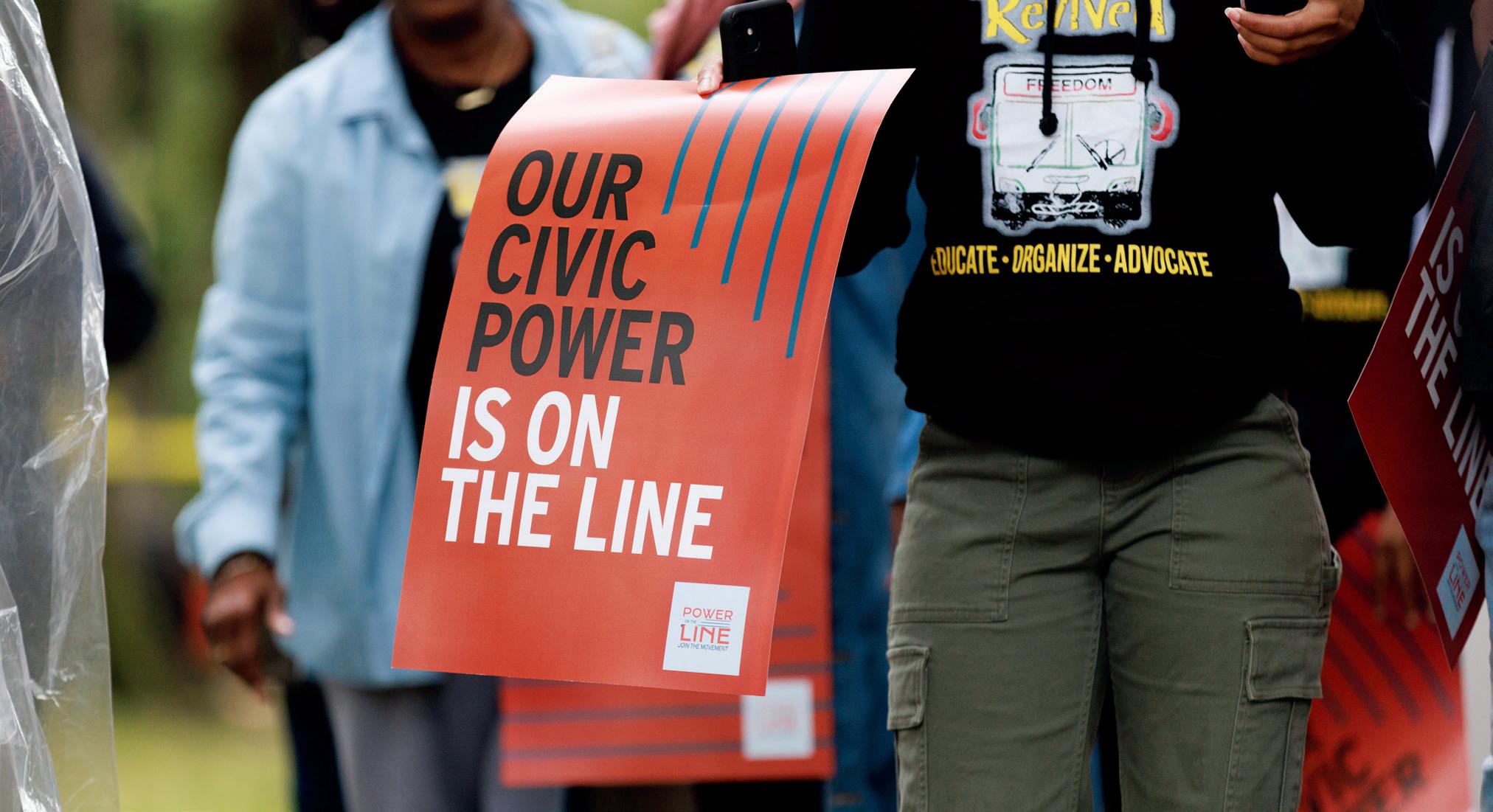
I remind my voting rights students that states run federal and state elections, so voting looks different in different states. The expansion of early voting and other changes based on the concept that we want as many people to vote as possible creates many issues to dispute.
Some people bring up the possibility of fraud. Yes, there could be issues with some early voting, but we’ve got pretty good safeguards for that, particularly if we distinguish between early absentee voting and early in-person voting. In 2022, I voted early at my county government building. That is arguably no different from going to my precinct on the day of the election. Fraud-wise, there’s zero difference between those two things. Even with early absentee voting, stealing votes is just a hard thing to do. If you steal enough votes to actually flip an election, you’re going to get caught. It’s a fool’s game.
The specific issue in the Moore case is gerrymandering. Given that the party in power always has the power to set the rules, is it inherent in our system? Are there states that have found nonpartisan ways to draw districts?
So, you said a mouthful. There are multiple points in what you said. One, nonpartisan versus bipartisan. We don’t really do nonpartisan redistricting. We sometimes do bipartisan because we are stuck in a two-party duopoly, but they’re not the same. Even if there’s a third-party person involved, what they’re doing is carving up the districts for the two parties.
When we get past that, we then ask, “Are there legislatures that do it really well?” Not really. In our current hyperpartisan setting, legislatures can redistrict properly, but only if they have the will. It’s one of the reasons why I think depending on independent redistricting commissions — and I’ll limit it to Virginia at this point — is an abdication. When a legislature says it’s just too hard to redistrict because we don’t trust ourselves, then we need a new set of legislators. In Virginia, the commission never got anywhere near maps that enough of them could agree on, so it went to the Virginia Supreme Court. The Court told two special masters to draw a single map for the court to approve. That is not democracy. It is rule by special master.
What electoral reforms seem promising to you?
An expansion of ranked choice voting would be very interesting. People say it’s confusing, but anybody who’s ever gone to a restaurant understands the concept. You say, “I want the shrimp cocktail,” and the server says they’re out that day, so you make a second choice. We do it all the time. It’s promising because you’re getting candidates who need to appeal to a wider group of the electorate. The more responsive our democracy is to the people, the more it’s going to reflect who we are and what we want.
Multi-member districting could also work well. Historically, it’s gotten a bad rap, but multi-member districting can be structured to allow people with a greater breadth of views to get elected. For example, let’s say we draw a district that is large enough to elect three people. If each voter may cast one vote, a candidate needs only 26% of the vote to get elected because if a candidate gets 26% of the vote, three other people can’t beat that candidate. What might that do? It might bring back conservative Democrats from southwest Virginia or the Shenandoah Valley. It might bring in liberal Republicans from cities. All of a sudden, the legislature looks different. It might also bring in a third
party, maybe somebody who appeals to both Democrats and Republicans. You have fewer lines to draw, so there’s, in theory, less gerrymandering.
We have to ask ourselves some serious questions. How tied to the people do we want our legislators to be? These are conversations that we need to be having in coffeehouses, around the kitchen table, and in the places where friends talk to one another, as opposed to just high-level screaming matches. We can do better. We may make it there over time. We’ll see.
One last question, a change of subject. You teach election law to students. What most surprises them? What shocks my students is the idea that historically we have not been about making it as easy as possible to vote. The Declaration of Independence is 246 years old. The 19th Amendment, which told states they can’t discriminate on the basis of sex in voting, is 102 years, so women have been officially welcomed into voting for less than half of our history. And of course, there are other citizens who were not allowed to vote until more recently. You start to realize that we have not been a country that has wanted as many people as possible to vote. That surprises students.
They’re also surprised when we talk about Bush v. Gore and the idea that fewer than 600 votes in Florida decided a presidential election. Many of them don’t remember it in any real fashion, whereas for those of us around at that time, it was seminal.
It’s fun for me as a professor to ask them, “How much would you pay to vote?” when we talk about poll taxes. Some people say they wouldn’t pay anything. Other people say they would pay whatever they could. That’s where we have a conversation about how, depending on how well resourced you are, you’re going to be willing to pay more to vote. Is that acceptable? A lot of students are flummoxed at the concept of a poll tax, and poll taxes were legal until the 1960s. I say to them, “That was a blink of an eye ago. Ask your grandparents about them.” ■
“WE HAVE TO ASK OURSELVES
SERIOUS QUESTIONS. HOW TIED TO THE PEOPLE DO WE WANT OUR LEGISLATORS TO BE?”

Years before she became a lawyer, Liz Burneson, L’18, was active in the community, particularly in politics and government affairs. She served as a voter protection volunteer, volunteered with several local nonprofits, and was appointed to Virginia Gov. Terry McAuliffe’s Advisory Board on Service and Volunteerism shortly before law school.
Since law school, however, she has narrowed her volunteering focus to pro bono legal services.
“I have this difficult-to-obtain skill, and there’s such a high demand for pro bono attorneys,” she said. “I think pro bono work is how my time is best used now.”
Burneson is hardly alone at Richmond Law. The school places a high value on pro bono and public service work, with a variety of opportunities for students to experience a service-based legal education. In particular, the Harry L. Carrico Center for Pro Bono and Public Service partners with local, national, and international organizations to offer programs targeting issues like housing and eviction, immigration, health and medicine, and no-fault divorces. Pro bono experiences are embedded in the curriculum and provide chances for students to practice their developing skills.
Those who show a particular commitment to volunteering their legal services can receive a Pro Bono Certificate upon graduation. More than 20% of the Class of 2022 took
this step, and collectively they performed nearly 6,000 hours of service.
With that foundation, it’s no surprise that Richmond Law alumni continue to prioritize pro bono work once they launch their careers, including several who have received recent recognition for their contributions to the community.
Here, four Richmond Law alumni talk about the role pro bono work has played in their careers and how they find meaning through service.
Mike Goldman, L’07, a partner at Hunton Andrews Kurth, specializes in mergers and acquisitions and transactional law — but he said a nonprofit law course early in law school revealed that he could apply his corporate and tax law knowledge to help local organizations. He went on to earn Richmond Law’s Pro Bono Certificate and continues to work with nonprofit organizations on governance and operations issues.
“I wasn’t the type, admittedly, that was going to go into public interest law,” he said. “But I’ve always been interested in helping nonprofits. I think they do amazing work on shoestring budgets thanks to the blood, sweat, and tears of individual volunteers who are committed to the mission.”
Goldman was introduced to the Greater Richmond Bar Foundation as a young associate when a colleague shared a message from the GRBF Pro Bono Clearinghouse, a signature program that provides free legal services to Virginia nonprofits. They were looking for support with several transactional law opportunities, and Goldman knew he
had something to offer. He worked with a Hunton partner on articles and bylaws and said it was eye-opening to see how much they could help.
Goldman has since served on the GRBF’s board, chaired the Pro Bono Clearinghouse effort, and was president in 2020-21. He recently received GRBF’s Benjamin R. Lacy IV Volunteer Award. He also serves as co-chair of Hunton’s Richmond office pro bono committee.
He encourages law students and new attorneys to take advantage of pro bono opportunities — whether through the GRBF or other avenues — whenever possible.
“As a law student, you can’t really understand how important it is to take every opportunity that comes your way,” Goldman said. “Pro bono opportunities are just as good — and sometimes even better — than billable work.
“I always tell law students to try it all, and when you find something that makes you feel good or you feel passionate about, whether it’s billable or pro bono, do that. The more you do what makes you feel good, the happier you’ll be at work.”
Goldman said his pro bono work played a pivotal role in developing skills early in his career. As a junior associate, he often worked in the background, listening and learning from the more experienced attorneys around him. But when he took on a pro bono case, he could take the lead on interacting directly with clients, guiding negotiations, and translating requests — all skills that take practice.
In addition, when he didn’t know the answers to questions, he had to figure them out independently. Pro bono work gave him the space to conduct his own research without worrying about the ticking clock of billable hours.
“No pro bono client would challenge how much time I spent because the cost was zero,” he said. “It was a nice, freeing feeling, and that research was applicable to both my pro bono and billable clients.”
Burneson is now assistant general counsel at the University of Richmond but initially worked as an associate at Hirschler Fleischer. There, she said, her landlord-tenant pro bono work allowed her to hone her litigation skills, which supported her billable work in commercial litigation and employment counseling.
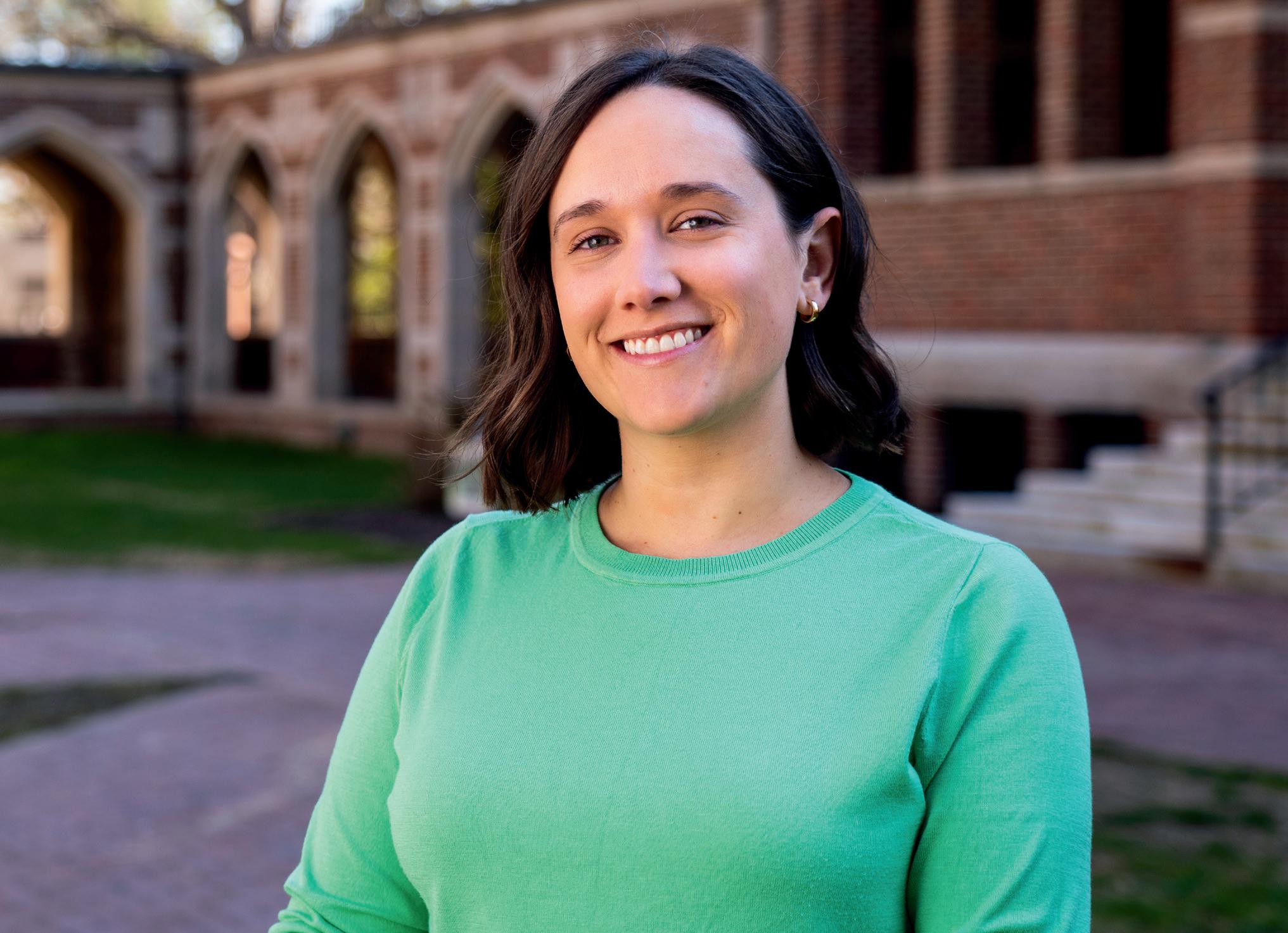
“Even though I was at a firm where young lawyers got a lot of opportunities to deal with clients directly, it was something I needed more experience in,” she said. “I got to prepare for and go to trial on a pro bono case early on in my career. And pro bono work allowed me to work oneon-one with clients and develop a personal style that has served me well in my career.”
She said it’s also essential for beginning lawyers to remember that they provide a valuable service and have access to resources that many people don’t.
In addition to her housing work, Burneson has spent several years volunteering with CancerLINC, a nonprofit that provides free legal services to cancer patients in Richmond. She recently received the Krista Latshaw Pro Bono Award from CancerLINC.
She recalled one client — a teacher planning a move to a new state — who had a lot of questions and concerns about when to disclose her cancer diagnosis to her new employer and the accommodations she would need for treatment.
“We sat down and talked through the employment laws, what her new employer could and couldn’t do, and what the consequences would be if they violated the law,” Burneson said. “She left feeling much more relaxed about the process.
“The need for pro bono services is so great that if you don’t take on a client, that client is probably not going to have any representation.”
— LIZ BURNESON, L’18
“I think a lot of young lawyers may hesitate to do pro bono work because they don’t know all the answers yet. But law school teaches you how to find the answers and how to think about things. It’s also good to remember that the need for pro bono services is so great that if you don’t take on a client, that client is probably not going to have any representation.”
Burneson said her pro bono work typically falls into one of two categories: services that align with her practice and work that is outside her specialty but involves an issue she’s passionate about.
One of her current passion projects began when she was in law school and met Tara Casey, director of Richmond Law’s Carrico Center for Pro Bono and Public Service. Through the center, Burneson got involved with the Trans Law Collaborative, a partnership with the Virginia Equality Bar Association and Equality Virginia that mobilizes lawyers and law students to assist trans and nonbinary clients in changing their names and gender markers on government documents.
“The name change clinics were something that I personally cared a lot about and wanted to help with,” she said. “It started with a passion, and I figured out the skills.”
For Sarah Warner, L’05, eviction diversion has been a longtime interest. In 2019, GRBF partnered with Housing Opportunities Made Equal and Central Virginia Legal Aid Society to launch the Eviction Diversion Program after Richmond was identified as having the second-highest eviction rate in the U.S. Warner represented her firm, ThompsonMcMullan, at EDP trainings and events and set aside time every week to represent clients in court.
The EDP recruits volunteer lawyers to assist residents once they’ve received an unlawful detainer but before they’re evicted. The volunteers draft a payment plan to submit to the courts and request a continuance. Residents also receive monetary assistance to help catch up on back rent.
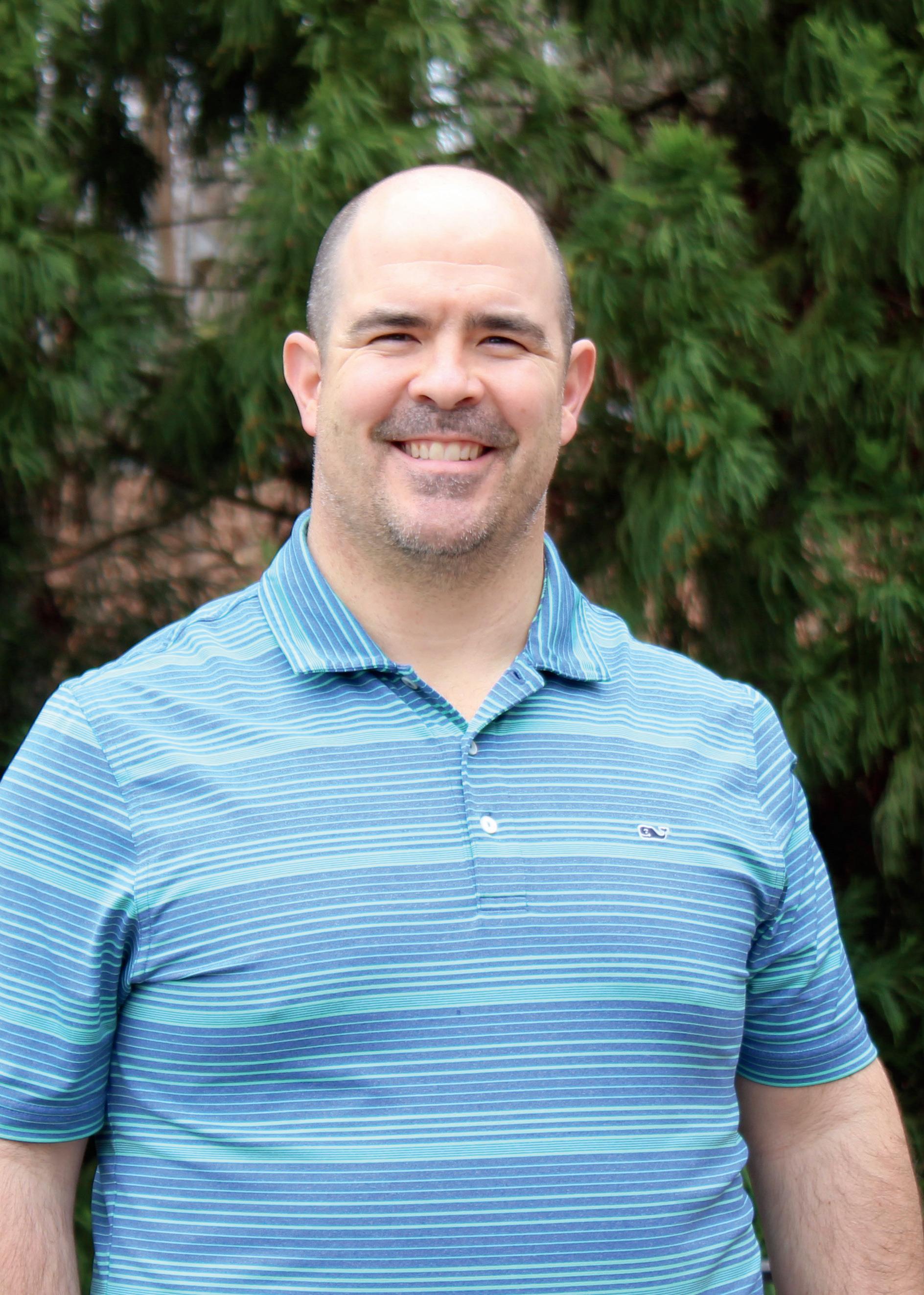
Warner said eviction diversion pro bono work was an easy fit thanks to her work as a transactional attorney, as well as her husband’s work with HOME and other nonprofits addressing affordable housing in Virginia. It was also a chance to form relationships with community members who shared her interests.
“I now primarily work by myself,” said Warner, who recently received the John C. Kenny Pro Bono Award from the Richmond Bar Association for her work in eviction diversion. “But I feel like pro bono work has connected me to nonprofits and larger firms that I wouldn’t have worked with otherwise. And I enjoyed the connections with other volunteer attorneys and meeting with my clients.”
“
I always tell law students to try it all, and when you find something that makes you feel good or you feel passionate about, whether it’s billable or pro bono, do that.”
— MIKE GOLDMAN, L’07
During her 19 years with the State Corporation Commission, Allison Held, L’96, focused her practice on energy law and telecommunications and worked as a legal adviser to the commission chairman. But she also pursued frequent pro bono work in the community, including serving on the board of CancerLINC.
As part of her work with CancerLINC, Held started reading about medical-legal partnerships, or MLPs. Like CancerLINC, MLPs pair volunteer lawyers with patients — but rather than work through an external organization, the attorneys collaborate directly with a hospital.
She approached a fellow board member and executive from Virginia Commonwealth University’s Massey Cancer Center, and they agreed to bring CancerLINC training and staff on-site as an early MLP. They initially focused on cancer patients but later expanded to provide services to children and families at the Children’s Hospital of Richmond.
The Massey MLP operated in a volunteer capacity for several years, but they continued to receive requests to serve patients in other areas of the hospital. In 2017, Held approached the MCV Foundation at VCU with an offer to take a one-year sabbatical to create a strategic business plan and organizational structure for a formal MLP within VCU Health. Her plan was approved and funded, and the MLP launched with full on-site services in early 2018. Held was invited to stay on and now serves as the director of the MLP and associate general counsel.
Held said the MLP has grown to serve nine different patient populations at VCU, and they have two community locations. They work with six legal partners in the community, including Richmond Law students enrolled in the Aging and Disability Law Practicum class. She said relatively simple tasks — like following up with a landlord about addressing mold or bedbugs after they’ve ignored
• Liz Burneson, L’18, assistant general counsel for the University of Richmond, received the Krista Latshaw Pro Bono Award from CancerLINC, which is given annually to one of the organization’s volunteer attorneys.
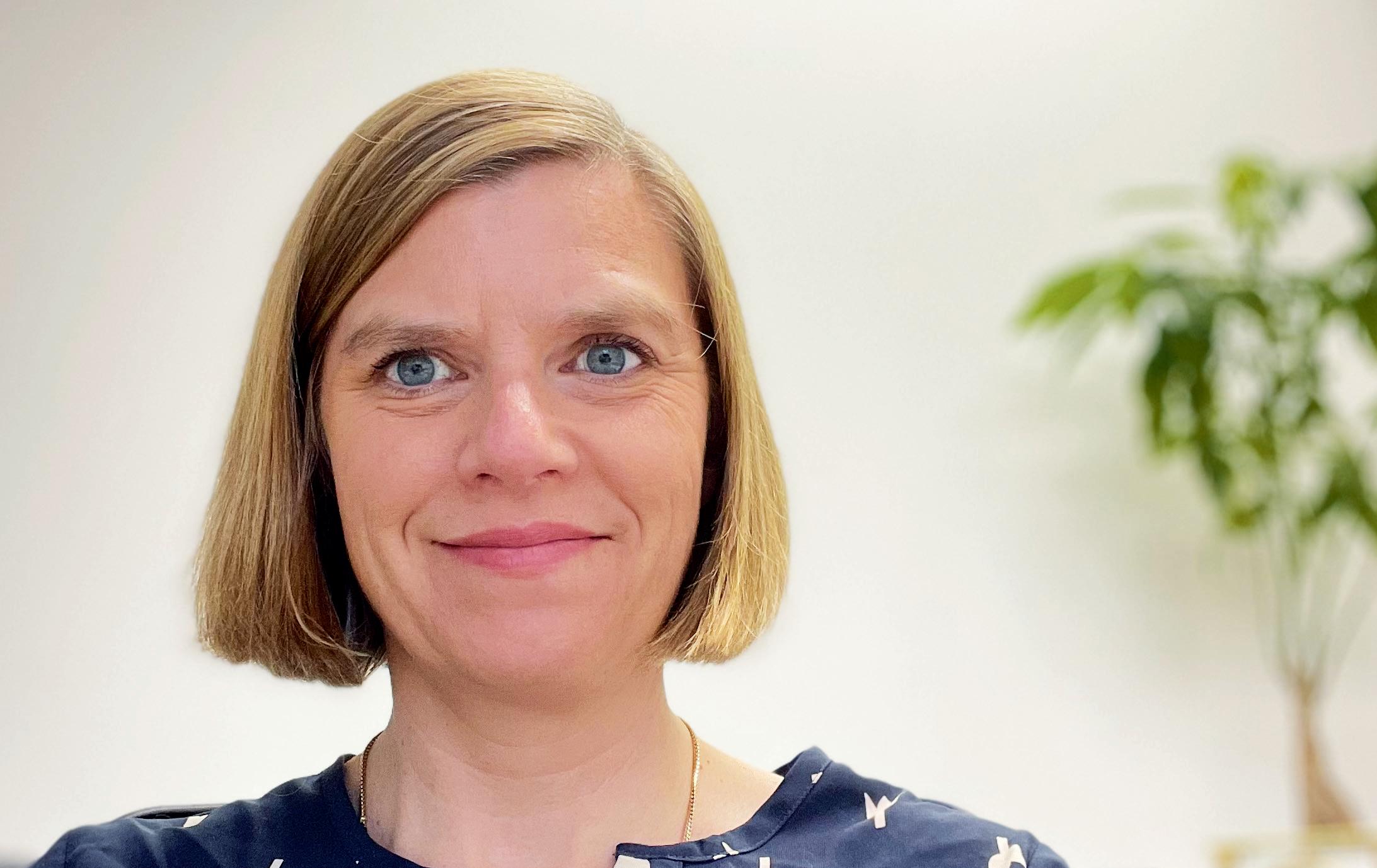
• A partner in Hunton Andrews Kurth’s corporate finance and mergers and acquisitions group, Michael Goldman, L’07, has dedicated a significant amount of his time to pro bono work. He is the past president of the Greater Richmond Bar Foundation, which presented him with the Benjamin R. Lacy IV Volunteer Award.
• Allison Held, L’96, associate general counsel and director of the Medical-Legal Partnership at VCU Health, received the 2022 CPBO Pro Bono Partner Award, along with McGuireWoods and Dominion Energy. Given by the Pro Bono Institute, the award recognizes innovative pro bono collaborations between in-house legal departments, law firms, and public interest organizations.
• Following 16 years at ThompsonMcMullan, Sarah B. Warner, L’05, is now a solo practitioner focused on business and finance law. She received the John C. Kenny Pro Bono Award from the Richmond Bar Association, which is given to an individual or firm that provides legal services to the poor and underserved in the Richmond Metro area.
“Pro bono work has connected me to nonprofits and larger firms that I wouldn’t have worked with otherwise.”
— SARAH B. WARNER, L’05
letters from doctors — can lead to meaningful action for their clients.
“We provide free legal services to low-income patients and families,” she said. “We address social determinants of health, such as safe and stable housing, access to food and medicine, and public benefits. Our lawyers provide services in almost every area of civil law.”
VCU Health, along with McGuireWoods and Dominion Energy, received the 2022 CPBO Pro Bono Partner Award from the Pro Bono Institute for the MLP. The award recognizes innovative collaborations between in-house legal departments, law firms, and public interest organizations. She nods to her colleagues at VCU who are committed to the MLP’s mission and serving all patients — a passion she shares.
“As much as I loved working for the SCC, I find the MLP to be so much more in line with what I have been passionate about in my career,” she said. “It’s very meaningful to see the impact that we’ve had on patients and our providers and our community through the work that we’re doing.
“I feel really lucky that I was able to find that in my career.”
All four alumni were quick to say that attorneys have a set of skills that aren’t universally accessible and that something as small as a letter or a phone call can make a big difference to a client.
Held, who volunteered for CancerLINC in law school and briefly worked for the organization before joining the SCC, said she was often moved by the stories of her clients.
She described one young woman who was diagnosed with terminal cancer and given about nine months to live. The patient’s employers sent flowers to her hospital room one day and a termination letter the next.
“She had worked for them for 10 years and just wanted to live the rest of her life with some income so she could spend time with her family,” Held said. “I went to bat for her, and it didn’t take very long, or much effort, to get her Social Security disability income.
“Some cases really are that simple. All it requires is a five-minute phone call to make a difference for someone who doesn’t have access and can’t afford a lawyer.”
Warner said pro bono work takes on an even deeper meaning when it leads to changes that ripple out beyond a single client. For instance, she and other lawyers involved with the EDP have developed connections with a handful of landlords around Richmond. She mentioned one in particular that had good relationships with his tenants — and often knew when they were struggling. He also recognized that an eviction could limit tenants’ future housing options and wanted to avoid it when possible. So he started proactively contacting the EDP to refer tenants who were behind in their rent.
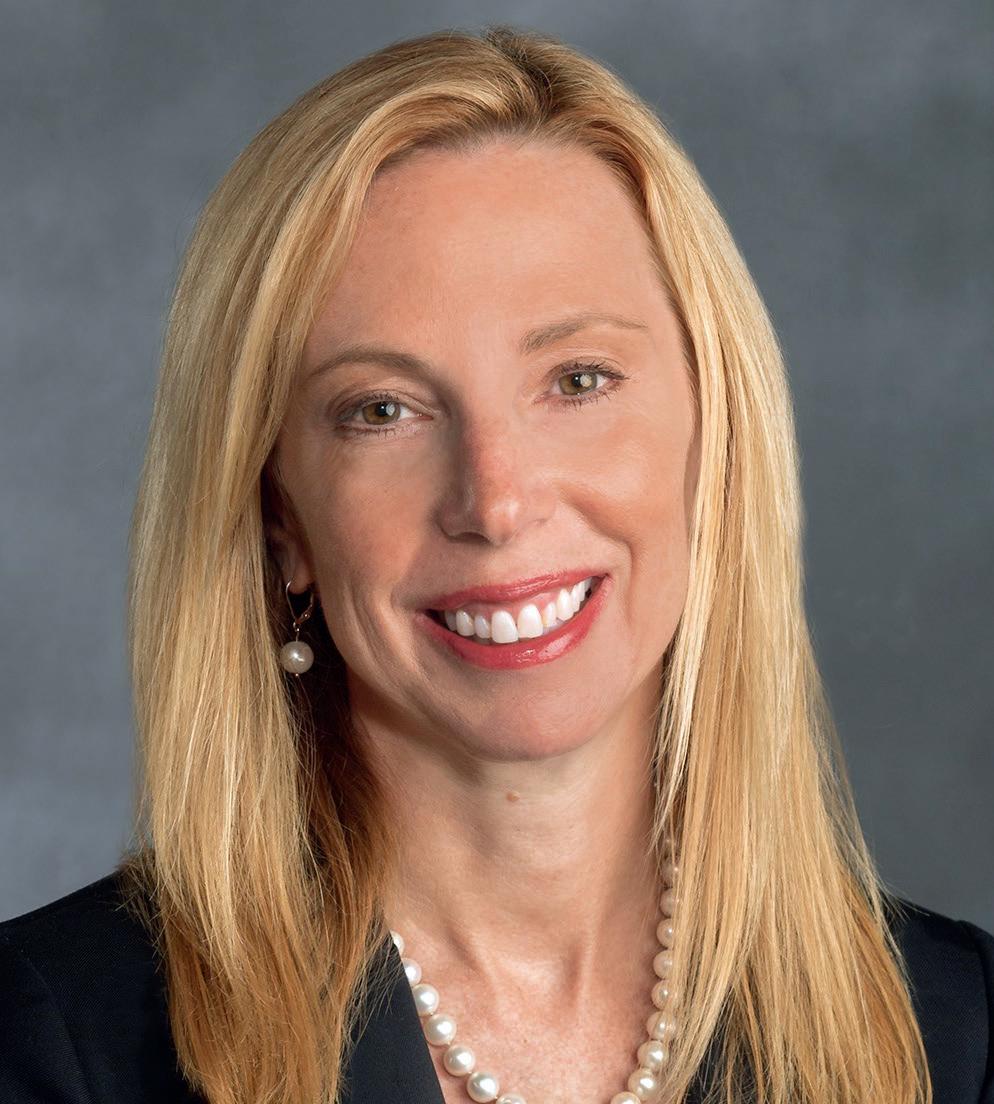
“It felt like such a huge win,” Warner said. “Part of the obstacle with eviction diversion is getting to the landlords because they’re not required by statute to do this except in limited cases. Most of the program hinges on the landlord agreeing to participate.”
She added that simply speaking up is a significant step; for EDP clients, it’s often the only thing that will slow down an eviction hearing.
“There’s nothing you can do that hurts the situation,” she said. “You can only help.” ■
“[Sometimes] all it requires is a five-minute phone call to make a difference for someone who doesn’t have access and can’t afford a lawyer.”
— ALLISON HELD, L’96
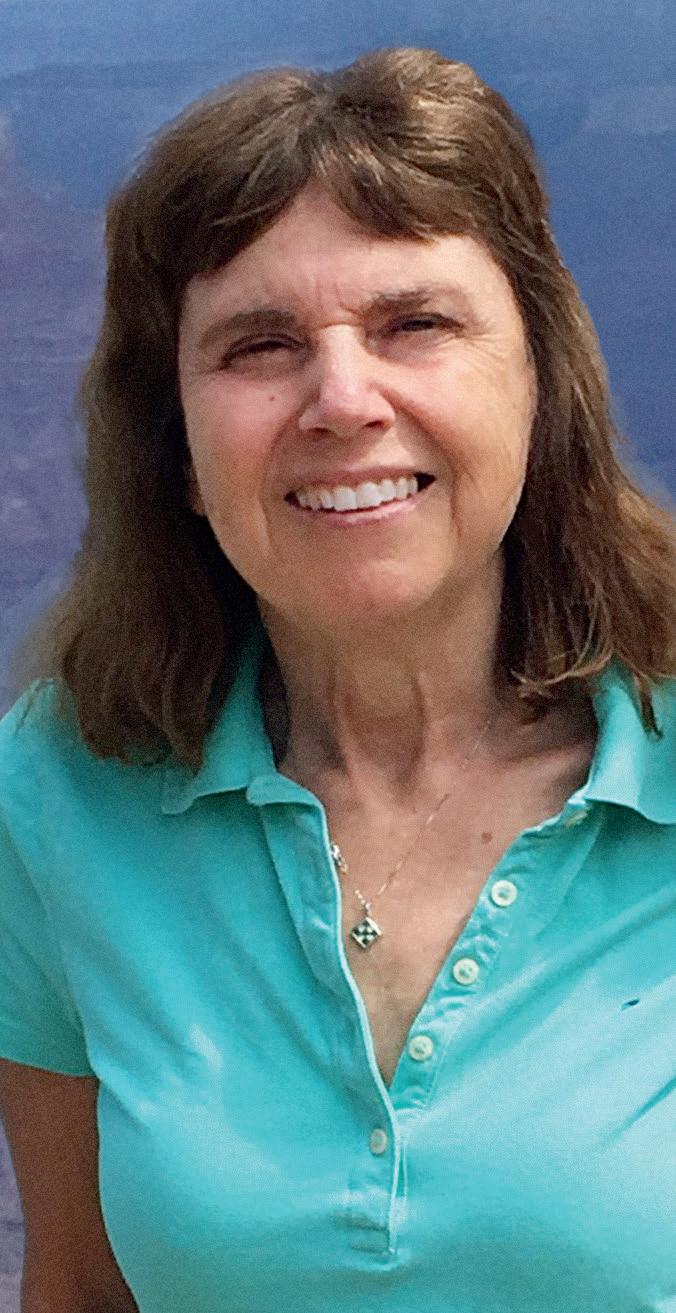
JANE BROWN RANSON, CLASS OF 1923, BROKE NEW GROUND WHEN SHE BECAME RICHMOND LAW’S FIRST FEMALE GRADUATE. A CENTURY LATER, ANOTHER WOMAN GRADUATE IS AT THE HEART OF A MILESTONE FOR THE SCHOOL.
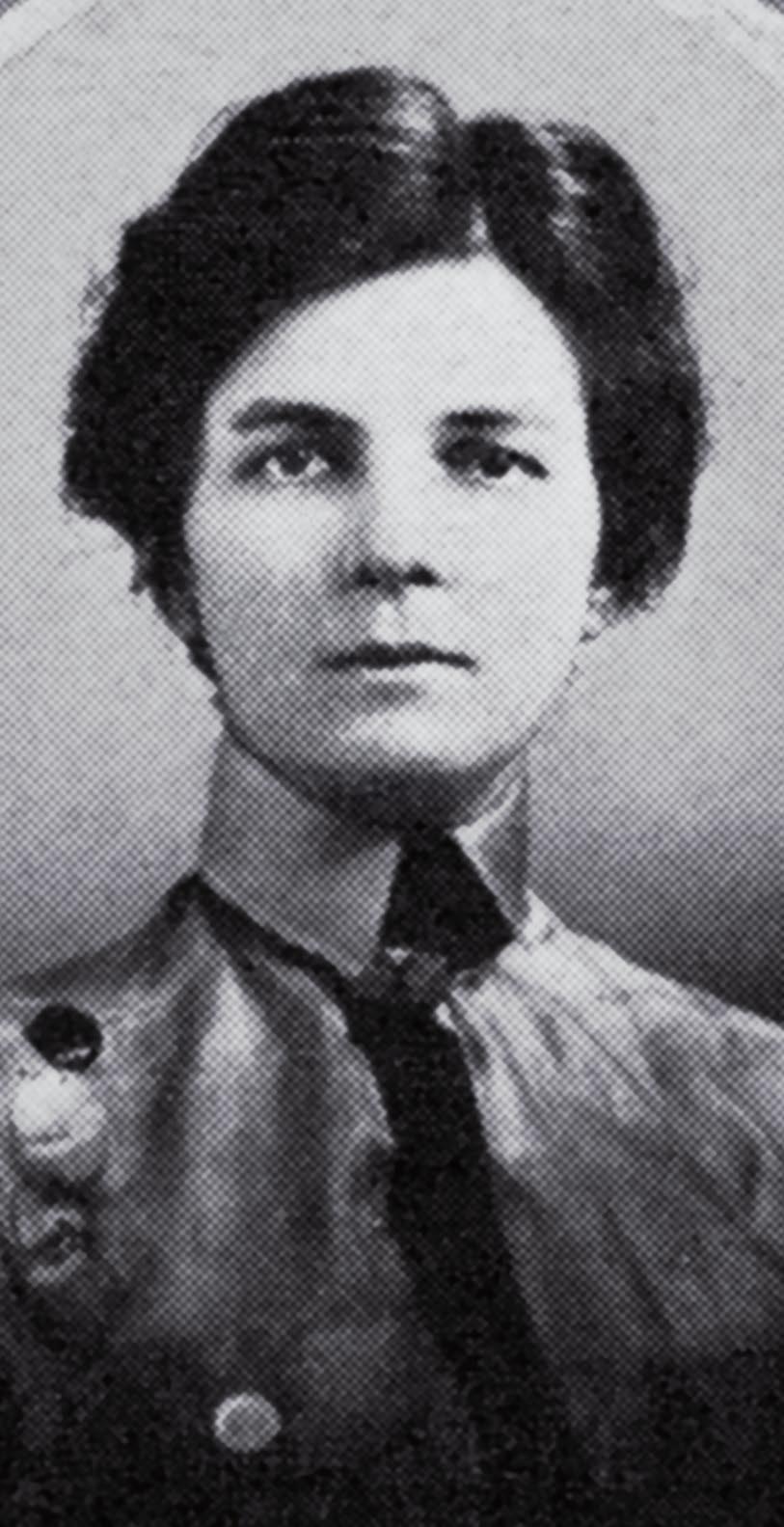 By Matthew Dewald
By Matthew Dewald
the graduation of the first woman from Richmond Law. Jane Brown Ranson graduated in 1923, less than a decade after the university established Westhampton College and began accepting women as undergraduates in significant numbers. A century after this important milestone, the school is celebrating another unique first: its first professorship named in recognition of a woman, thanks to a generous gift from the family of Nancy Litchfield Hicks, L’85.
Ranson entered Richmond Law at a time of significant change for women in the legal profession. Since the late 1880s, Virginia’s legislators had been considering and rejecting bills that would have permitted their licensing. Even as other states increasingly opened the profession, Virginia’s legislature emphatically underscored its opposition in 1895, amending laws governing professional licensing by replacing the phrase “any person” to “any male citizen” after a woman named Belva Lockwood successfully sued and was temporarily admitted to the Virginia bar in 1894 based on the existing statute’s gender-neutral language. When Virginia finally admitted women to the bar in 1920, it was one of the last three states — alongside Rhode Island and Delaware — to do so.
The decisive push came from the adoption of the 19th Amendment. Although Virginia’s legislators voted against ratifying it, they recognized that it would nonetheless take effect nationally and enacted what historian Peter Wallenstein calls “contingent legislation” in his book Blue Laws and Black Codes: Conflict, Courts, and Change in Twentieth-Century Virginia. They did so “recognizing a relationship between exercising the franchise [i.e., voting] and practicing the law,” he wrote. The law’s new language became “all male and female persons,” and then, with another tweak in 1922, “all persons, male and female.”
Richmond Law was then a night program offered by Richmond College, soon to be the University of Richmond.
Documentation from the Library of Virginia indicates that it was ahead of the commonwealth. A woman named Rebecca Lovenstein — a Lithuanian immigrant and married mother of two who was in her early 30s — began taking classes as early as 1918. She and Ranson were two of four women enrolled in Richmond’s law program in 1920, according to Wallenstein.
Lovenstein did not stay to complete her law degree. Instead, she made history. As soon as women became eligible to sit for the bar examination in Virginia, she and another woman became the first two Virginia women to pass it, in June 1920. Lovenstein almost immediately qualified before a judge in Richmond’s Hustings Court and, on July 1, 1920, paid her fee and became the first woman licensed to practice in Virginia. This former Richmond Law student set another milestone in 1925 when she became the first woman to present oral arguments at Virginia’s Supreme Court. In an amusing twist, the case, Mazer v. Commonwealth, was about a violation of prohibition laws, though in this case the prohibition in question targeted alcohol, not women. She and co-counsel won the case.
In 1923, Ranson became the first woman to complete the law degree at
In 1923, Ranson became the first woman to complete the law degree at Richmond and, in doing so, became one of the first two women to earn a law degree in Virginia.
“
Richmond and, in doing so, became one of the first two women to earn a law degree in Virginia. Alongside her was a fellow Spider, Elizabeth Tompkins, a 1919 graduate of the newly formed Westhampton College, who was the first woman graduate of the law school at the University of Virginia, also in 1923.
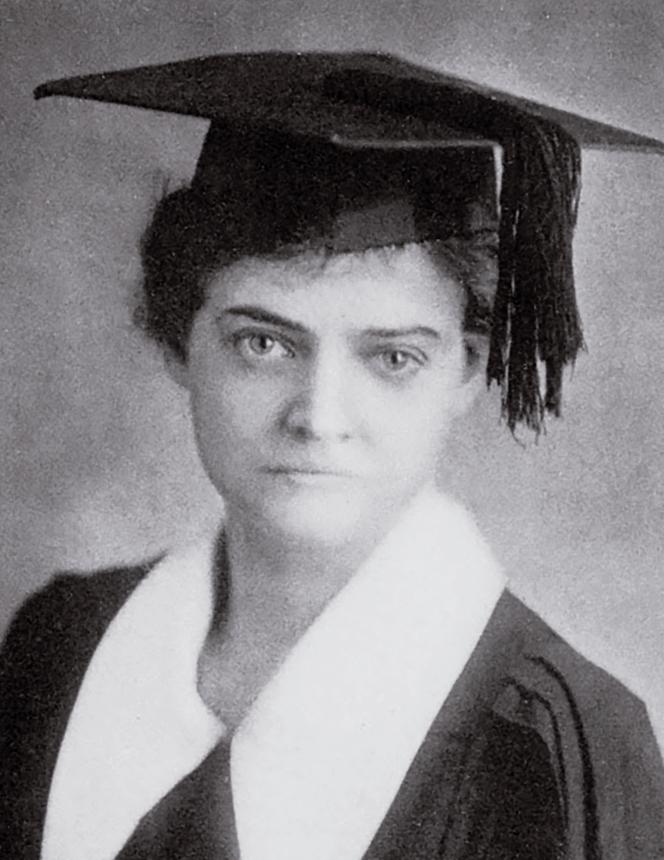
Little documentation exists from Ranson’s time in law school, but a bit of the atmosphere in which the women studied can be gleaned from sources tied to Tompkins. One source is a letter that she wrote to her father in 1921 asking him to let her transfer to a different law program. She wrote that she was frustrated that “there is no one to argue with when I leave class at noon. I have no law afterwards. ... [Meanwhile,] the boys at practically every fraternity have a round table and discuss law every night for an hour. Of that I know nothing.”
The law program where she preferred to be was Richmond Law. In addition to persuading her father of the financial benefits of her living at home, she praises its reputation as “getting to be nothing to be snipped at.” She says that one of its faculty — Walter McNeill, namesake of today’s McNeill Law Society — “is considered good by all” and notes that another professor is responsible for the state bar exams, “which I am turning heaven and earth to pass.” Her father, apparently, resisted the move, and things apparently settled down for her. In 1980, she told Virginia Law Weekly that “it took [male classmates] one semester to find out that I was not after a husband and another semester to find out that I could do the work. After that everything was fine.”
Another source — and possible source of Tompkins’ consternation — is her dean at U.Va., William Lile. In his book, Wallenstein quotes Lile referring to his school’s three women students as “these new and strange beings” in a 1920 report to the president. When Tompkins graduated in 1923, Lile recorded in his diary that she was “an unusually capable person” but nevertheless predicted that “it will not be long before she deserts the profession” and will be found “rolling a baby carriage instead of wrangling in court.” He was very wrong, despite the post-graduation obstacles she faced breaking into the profession. She went on to a long legal career, dying at age 83 just two years after retiring from practicing. Over these years, she also took on leadership roles at Richmond, including serving as a trustee, and received an honorary Doctor of Laws degree in 1970. Since 1984, the law school has awarded a scholarship named in her honor; it has had 39 recipients to date.
Ranson may have encountered some difficulties in law school herself. Not long after graduation, she used her legal education to sue the university. At issue was a “most improved” award she received from the law school’s faculty, despite consistently ranking second in her class. In two defamation suits, she alleged that, through the award, the faculty intentionally implied that she had an inferior understanding of the law, thereby injuring her professional reputation. The outcomes of the suits are unknown.
Similarly, little is known about Ranson’s life. Historical records tied to a woman with her name who was then living in Richmond indicate that she was close to several men with legal careers. Her father was a judge, and she married an attorney in 1904. Tragedy quickly struck the newlyweds when her husband died the next year of tuberculosis after leaving Jamaica on a United Fruit Co. steamer, according to his obituary. The 1920 census, conducted around the time she enrolled at Richmond, lists her as a 35-year-old widow. It also gives some indication of her more recent life, indicating that she had become a trained nurse and was working as a supervisor at a state hospital. Other records suggest she was a military veteran who served as a nurse in the reserves in France during World War I. After law school, she began practicing. Richmond city directories for 1924 and 1925 list her as an attorney operating out of an office on North 11th Street, near today’s Valentine Museum, but she does not appear in subsequent directories.
In 1920, when Ranson began her legal education, the census recorded six women practicing law in Virginia. A decade later, it was just 27. Women’s numbers in the profession didn’t hit triple digits in Virginia until the 1950 census, and it would not be until the 1980 census that the number jumped into the thousands. Whether enrollment by women at Richmond Law mirrors those trends is unclear but seems likely. Reliable data that records enrollment at Richmond Law by gender dates back only to 1992. By that point, women were regularly making up between 45% and 50% of graduating classes, surpassing the number of male graduates for the first time in 1996. In three of the last five years, women have accounted for 57% or more of the graduating class.
These figures track with national statistics. Women made up just over 55% of law school students nationally
in 2020–21, and nearly five times as many law schools had female majorities as had male majorities, according to the American Bar Association. At five ABA-accredited law schools, the ratio in favor of women was two-to-one. When today’s students enroll, they are more likely than ever to encounter women as their professors; 55% of the current full-time faculty at Richmond Law are now women. They are also more likely to encounter women in administrative leadership. The latest data from Rosenblatt’s Deans Database at the Mississippi College School of Law in Jackson, Mississippi, show that 43% of the nation’s law school deans are women. That figure includes Richmond Law’s Wendy Perdue, the first woman to be dean of a law school in Virginia and the nation’s 11th-longest-serving law dean of any gender.
As the school celebrates the 100th anniversary of its first female graduate, it is also celebrating another unique first. This one — again — involves a woman. A generous gift from the family of Nancy Litchfield Hicks, L’85, has established the school’s first professorship named in recognition of a woman. Its first appointee is Jessica Erickson, founding director of the Richmond Law and Business Forum, which helps students prepare for careers in business law.
“Nancy loved it there,” said Hal Hicks, who made the gift in memory of his late wife. “I think she’d be very proud that there’s now a professorship named after a woman and that the first one to hold the position is a woman professor who is highly regarded in the field.”
Hicks’ gift to establish this professorship is a continuation of the ongoing generosity he has displayed over the last several years. Following her passing in August
2020, Hal and the couple’s three sons — Josh, Billy, and Matt, ’15 — established the Nancy Litchfield Hicks (L’85) Memorial Scholarship.
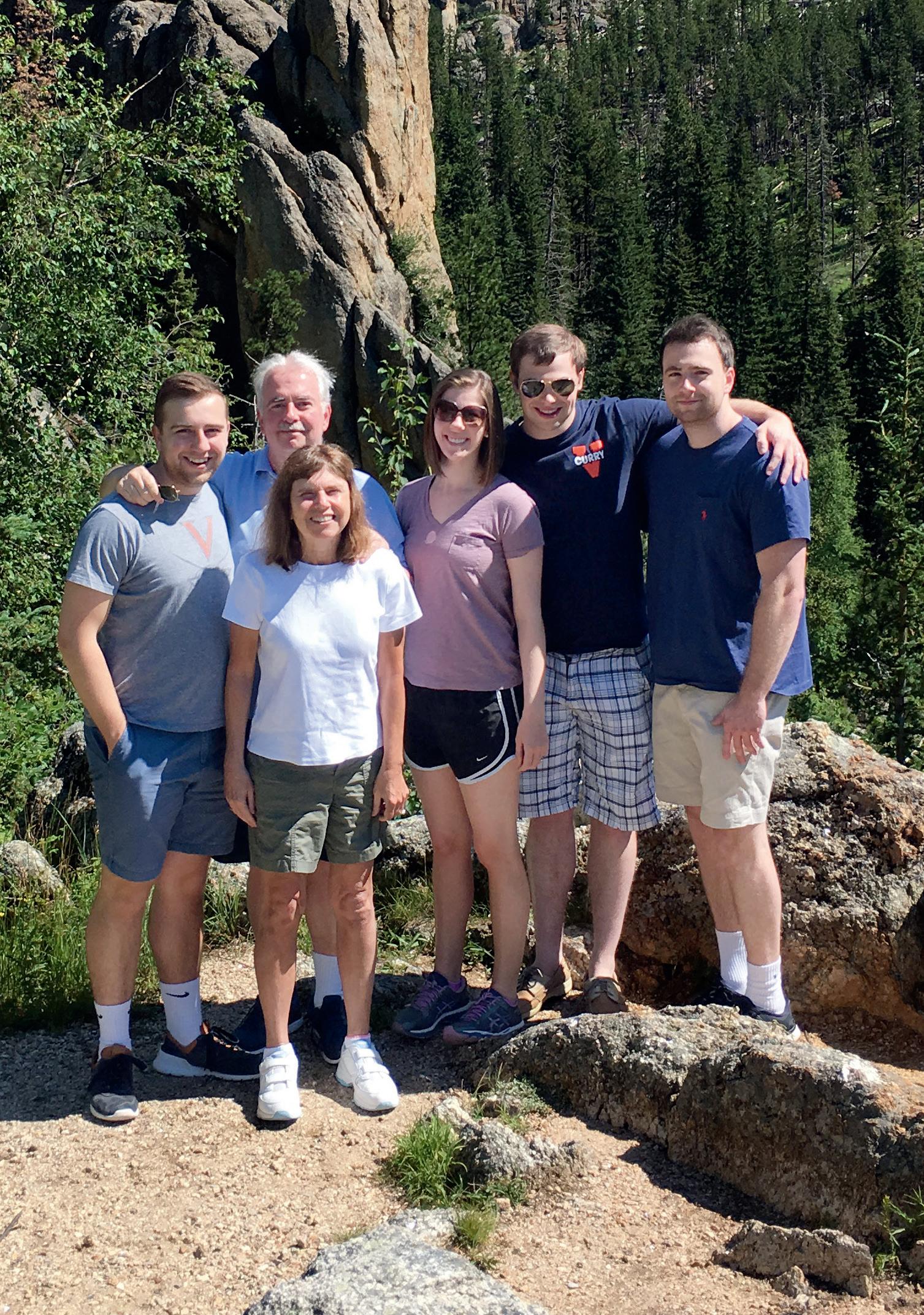
Two years later, inspired by the strength Nancy displayed throughout a difficult illness, Hal sought to do something more to honor her and other “strong women” in his life — the Hicks professorship. “Nancy was a strong woman. Her daughter-in-law, Jess, is a strong woman. And, yes, her 2-year-old granddaughter, Zoey, is certainly turning out to be a strong young woman and the absolute queen of the family,” he said.
Erickson was named the Nancy Litchfield Hicks Professor of Law in June 2022. A prolific scholar on the Richmond Law faculty since 2007, she teaches and writes in the areas of corporate and securities litigation. The 2020 School of Law Distinguished Scholar, she has published in the Journal of Empirical Legal Studies, Vanderbilt Law Review, Notre Dame Law Review, Boston University Law Review, and Iowa Law Review, among other publications. (Read more about her on Page 28.)
“Women are such an important part of Richmond Law’s story, and we are thrilled that this new professorship serves as an enduring tribute to two important women in our history,” Perdue said. “An endowed professorship is one of the highest academic awards that the university can bestow on a faculty member. This professorship is such a fitting way to honor two exceptional women. I am grateful to the Hicks family for making it possible.” ■
More celebration is planned. The school will host an event to toast the centennial of women at Richmond Law in fall 2023. Visit law. richmond.edu, follow @URlawschool on social media, and watch your email for details to come.
I think she’d be very proud that there’s now a professorship named after a woman and that the first one to hold the position is a woman professor who is highly regarded in the field.”
The path to legal academia wasn’t straightforward for Professor Jessica Erickson, the Nancy Litchfield Hicks Professor of Law. “There are people who go into law school knowing that they eventually want to end up in academia,” she said. “That was not me. I joined a law firm here in town, and candidly, I loved it. I thought I would be there for my entire career.”
Initially recruited to Richmond by Hunton Andrews Kurth and practicing law focused in corporate governance and shareholder litigation, Erickson began considering legal academia after conversations with colleagues who were teaching while practicing law. “I knew I loved my job as a lawyer, but I realized that I might love teaching law even more,” she said. This curiosity led her to join the Richmond Law faculty, where she has served since 2007. While teaching courses primarily focused on business law, Erickson believes it’s important for students to also know what it’s like to practice law. In 2021, she merged her experience in both arenas to launch the Richmond Law and Business Forum. The program, born out of conversations Erickson had while serving as the law school’s associate dean for faculty development, gives students an inside look into the practice of business law by hosting speakers on campus and coordinating networking events.
“I really wanted to think about how we can help students take that next step in their professional development by talking to lawyers, learning about the practice of law, and reflecting on what they want their own journey to be in the practice of law,” Erickson said. “The forum helps students understand what business lawyers do every day.”
The most popular set of events is a series called Business Law Over Dinner, in which two to three lawyers from a particular type of business law practice and a handful of students interested in that practice area gather around a table for dinner.
“These dinners allow students to learn about the particular practice area, but they also help students learn about the practice of law more generally,” said Erickson. “And I think those conversations are truly invaluable.”
Implementing the same strategy when she teaches, Erickson relies on the network of connections she built while practicing law to support the forum.
“I’ve been able to reach out to former contacts that I had back when I was in practice,” she said. “And they’ve been really willing to contribute and to help our students in that way. So, it’s been a real blessing to be in the same city where I practiced.”
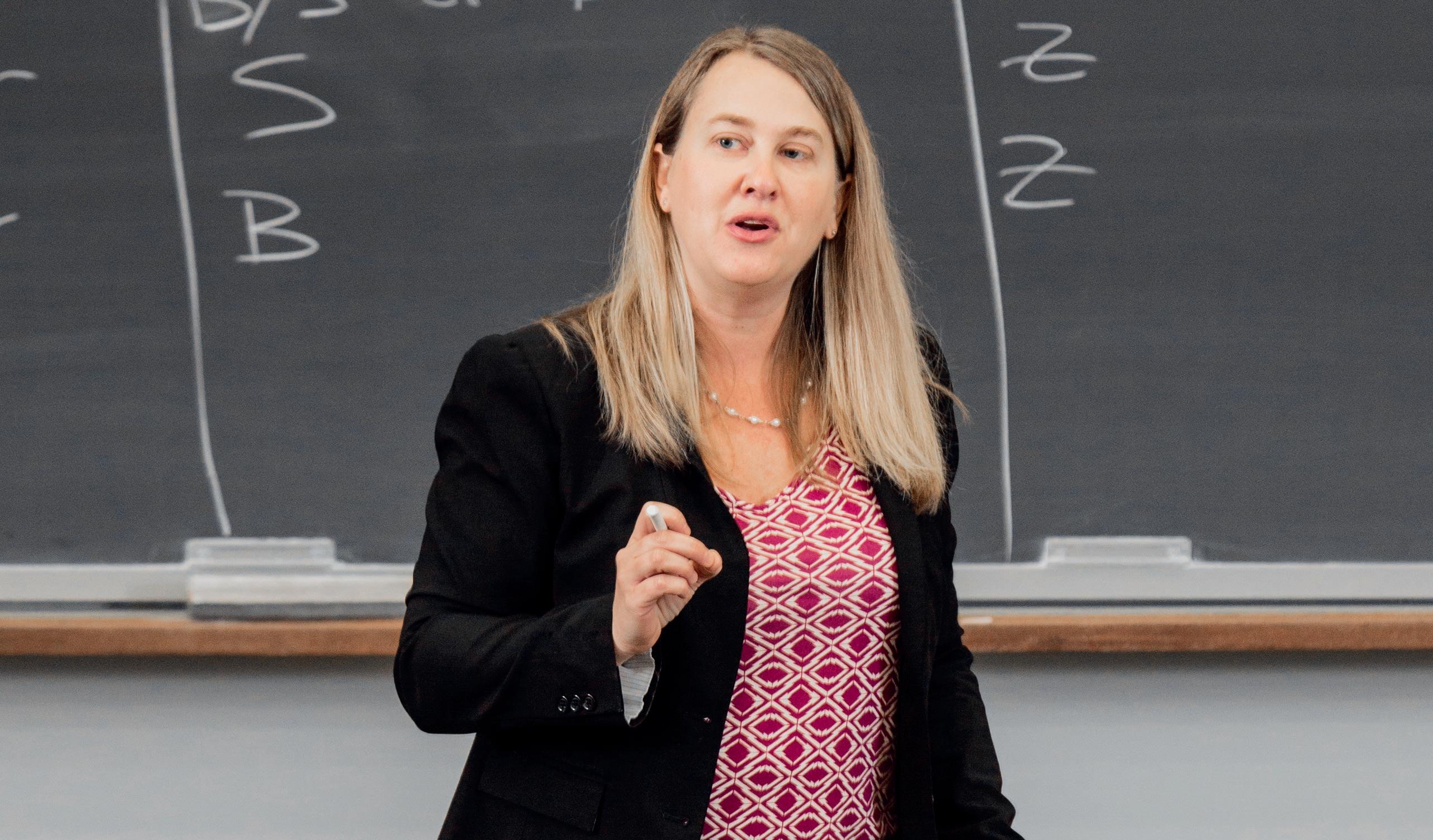
TARA CASEY was named to the Virginia Business Legal Elite 2022 list in the Legal Services/Pro Bono category.
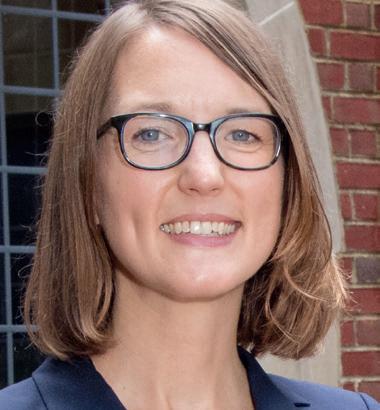
HANK CHAMBERS authored the “Hip Hop and Traffic Stops” chapter in Fight the Power: Law and Policy through Hip-Hop Songs published by Cambridge University Press. He also provided expert commentary on the 2022 election on VPM News Focal Point.
ERIN COLLINS ’
article “Abolishing the Evidence-Based Paradigm” was published by BYU Law Review She also served as a speaker for the “Leaving Carcerality Behind: Thoughts on Intervention with Gender Violence” panel discussion at the American Association of Law Schools annual meeting.
VINCENT CHIAO authored the “Transparency at Sentencing: Are Human Judges More Transparent Than Algorithms” chapter in Sentencing and Artificial Intelligence, published by Oxford University Press.
CHRISTOPHER CORTS published a series of articles devoted to the art of facilitating better conversations about controversial topics such as racism, bias, and intercultural competency for the University of St. Thomas Halloran Center Professional Identity Implementation blog.
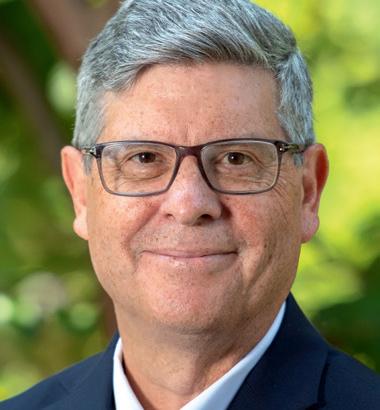
JOEL EISEN ’s article “COVID-19 and Energy Justice: Utility Bill Relief in Virginia” was published in University of Richmond Law Review
JIM GIBSON delivered the fall lecture “Uncoupling Trademark and Reputation” to the Houston Intellectual Property Law Association.
HAYES HOLDERNESS’ articles “Did South Dakota Neglect Transactional Nexus in Its Bill to Kill Quill?” and “Navigating 21st Century Tax Jurisdiction” were both cited in the Quad Graphics v. N.C. Department of Revenue North Carolina Supreme Court ruling — one in the majority opinion and the other in the dissenting. The case concerned the state’s ability to collect sales tax from an out-of-state company for goods delivered by a common carrier into the state after transfer of ownership and possession of the goods to the purchaser occurred out of state.
MARISSA JACKSON
SOW ’s article “Protect and Serve” was published in California Law Review.
JULIE MCCONNELL was recognized as one of 12 recipients of the 2023 Outstanding Faculty Awards by the State Council of Higher Education for Virginia and Dominion Energy. The commonwealth’s highest honor for faculty at Virginia’s public and private colleges, it recognizes superior accomplishments in teaching, research, and public service.
LUKE NORRIS ’ article “Federal Rules of Private Enforcement” is forthcoming in Cornell Law Review
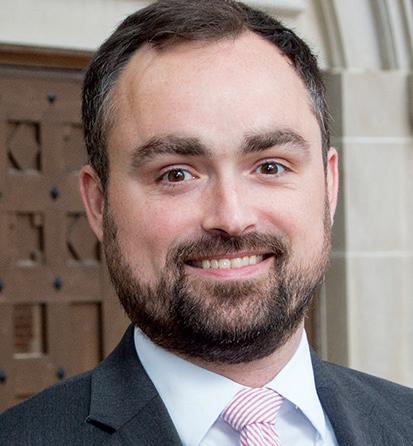
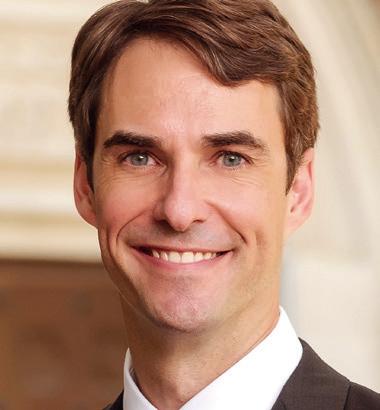
KRISTEN OSENGA ’s op-ed in Richmond Times-Dispatch explored the role of “patent thickets” in the rising cost of prescription medications.
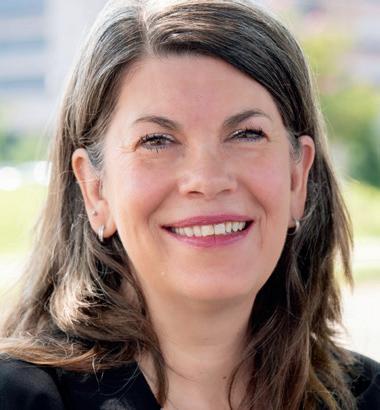
JOSH KUBICKI was appointed to the board of directors for the Center for Computer-Assisted Legal Instruction. In addition, Kubicki’s Legal Business Design Hub at Richmond Law is one of 10 — from a field of 60 — finalists in Bloomberg Law’s inaugural Law School Innovation Program, which recognizes law schools whose innovative programs are advancing new approaches to student instruction, legal technology, experiential learning, and other facets of legal education.
CORINNA LAIN delivered the keynote address at the Rio International Seminar on Constitutional Law and Institutional Design. Her talk focused on judicial supremacy, arguing that it is more porous and contingent than often described in debates.
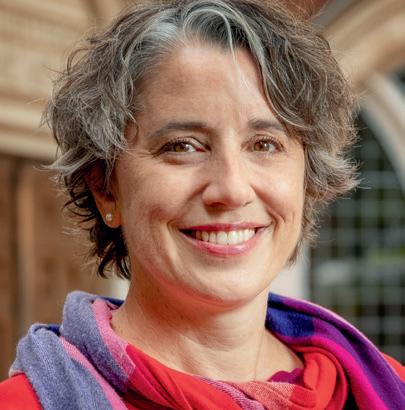
KURT LASH ’s article “Roe and the Original Meaning of the Thirteenth Amendment” was accepted for publication in Georgetown Journal of Law & Public Policy
DANIEL SCHAFFA ’s article “The Intergenerational Equity Case for a Wealth Tax” was published in University of Cincinnati Law Review
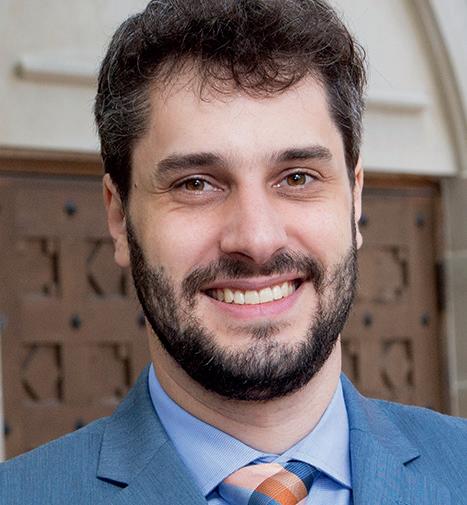
DANIELLE STOKES received a $47,066 subaward from the Alfred P. Sloan Foundation via Barry University for her threeyear project “Just Energy Transitions and Place,” which supports research related to state and local energy transition policies.
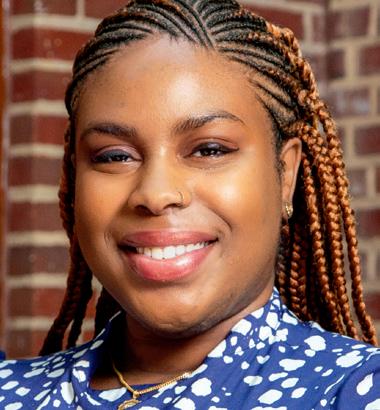
ALLISON TAIT moderated the “Teaching Tools and Questions of Inequality in the Wills and Trusts Classroom” panel discussion at the American Association of Law Schools annual meeting. She also published “Debt Governance, Wealth Management, and the Uneven Burdens of Child Support” in Northwestern University Law Review
DANIELLE WINGFIELD was a presenter for the “Seventy Years in the Making: Brown v. Board of Education from a Children’s Perspective” session at the American Association of Law Schools annual meeting. Her article “Movement Lawyers: Henry Marsh’s Long Struggle for Educational Justice” was published in University of Richmond Law Review
CHERYL CARLSON WOOD, W’71 AND L’79 , has been practicing law in Richmond since her law school graduation. She has no plans for early retirement but does plan more time off for travel. She, her husband, and their son all work together. Their other son is a lawyer in Oregon, and they have six grandchildren and a seventh one on the way.
BILL STRICKLAND, B’64 AND L’70 , is serving on the scholarship selection committee for the Class of 1964 Scholarship Fund with fellow undergraduate classmates.
KATRIN BELENKY PECK, L’76 , writes, “I was fortunate to pursue a 27-year-plus career as an in-house lawyer practicing corporate and information technology law, as general counsel of one New York City-based site software company; at Cap Gemini/Olivetti; and at two money center NYC-based banks. After asking for and receiving a generous package from JPMorgan Chase in 2005, I founded and grew a consulting company for arts, education and economic empowerment nonprofits. In this role I have managed annual and capital campaigns, facilitated yearly strategic planning sessions, and lectured on
nonprofit board development issues. Also, I just completed a five-year term as co-president of my Vassar class planning and fundraising for our 2022 50th Reunion. My husband, Sam, and I live near Bethesda, Maryland. We have six grandchildren.”
RICK CHESS, L’77 , was one of two recipients of the 2022 Traver Award, given each year by the Virginia State Bar Real Property Section and Virginia CLE. The award honors lawyers who embody the highest ideals and expertise in the practice of real estate law. Rick practices with the Chess Law Firm and has spent his career paying forward the mentorship he received from Courtland Traver, for whom the award is named. Rick was an area representative for the Real Property Section, served as chair of the commercial real estate committee, and is co-chair of the membership committee.
During the fall of 2021, NANCY CLEVINGER CARPENTER, W’72 AND L’80 , and Jeanie McFall Simar, W’72, along with husbands John and Howie, enjoyed a nearly three-week trip to Europe, spending time in France, Germany, and Austria. Besides enjoying picturesque hiking trails and great weather, highlights included a special flag-raising ceremony at the Normandy American Cemetery and honoring the Bedford Boys, 19 young men from Bedford, Virginia, killed in the first few minutes of D-Day. This tribute made the time in Normandy especially memorable. The mountains, landscapes, lakes, gorges, castles, churches, towns, tours, and delicious food made for a wonderful trip. England and Scotland are in their future!
SUSAN WARD, W’70 AND L’81 , retired as Virginia Hospital Association general counsel in 2015. Son Chris was married in May 2022 at the University of North Texas, where he is doing postdoctoral research.
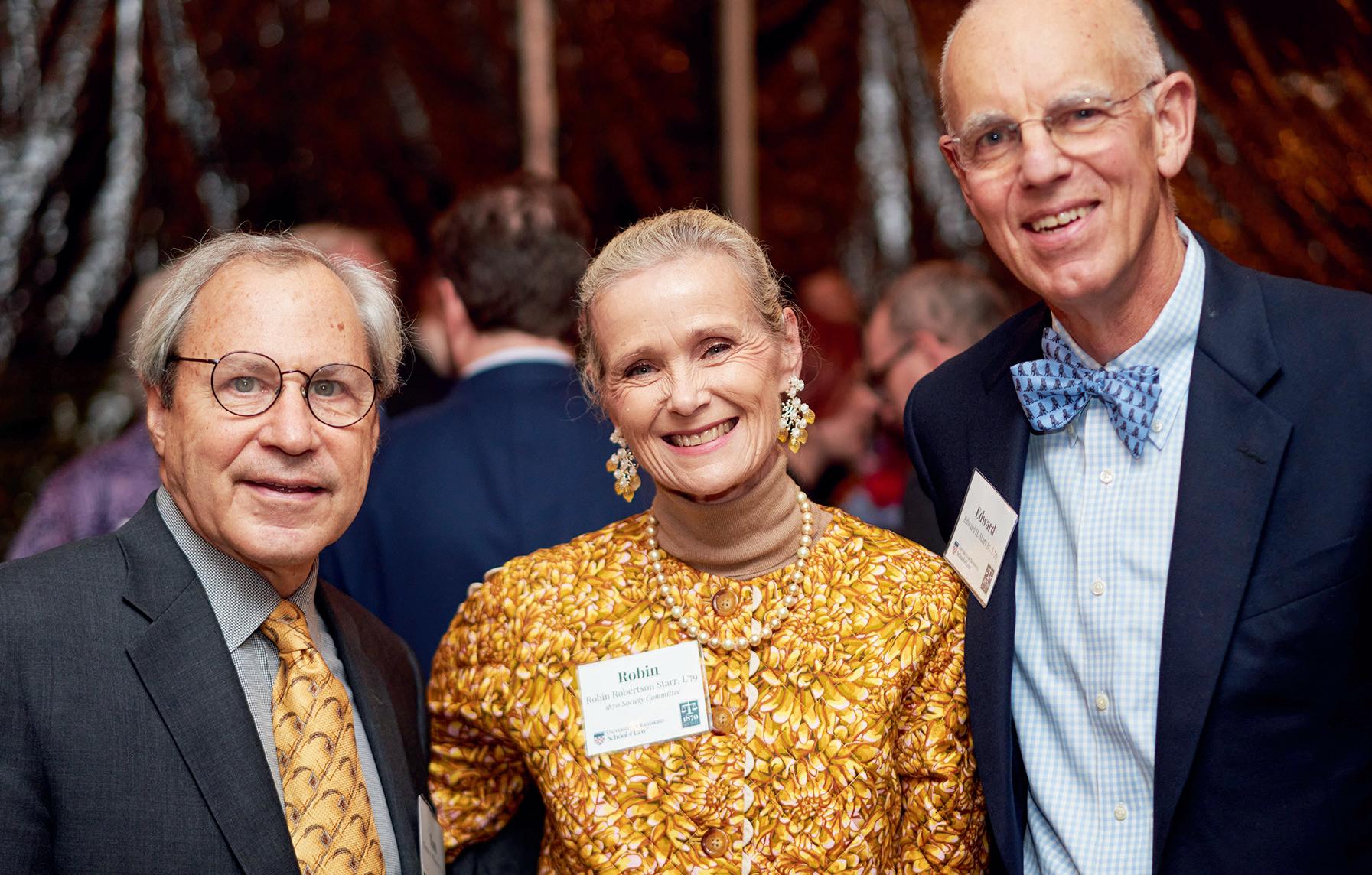
RON WILEY, L’83 , was one of two recipients of the 2022 Traver Award, given each year by the Virginia State Bar Real Property Section and Virginia CLE. The award honors lawyers who embody the highest ideals and expertise in the practice of real estate law. Ron is underwriting counsel for Old Republic National Title Insurance Co. He worked in private practice until 1991, when he decided to become a high school Earth science teacher. He continued to practice law during summer breaks until 1993, when he returned to law full time as senior vice president and regional counsel for a regional title insurer. He joined Old Republic Title in 2016. He has served on the Virginia State Bar’s Real Property Section and its board of governors, including a year as section chair. He enjoys teaching and has been an instructor for numerous Virginia CLE programs and coordinated the continuing education program for Virginia agents. He has helped teach real estate transactions and finance at Richmond Law since 2013.
ROBERT B. RIGNEY, L’87 , has been elevated from the Norfolk General District Court to the Norfolk Circuit Court.
Following a promotion, STEVE EUBANK, L’94 , is chief deputy commonwealth’s attorney for the city of Fredericksburg,
Virginia, where he was previously an assistant commonwealth’s attorney.
The Oklahoma Veterans Commission appointed SARAH LANE, L’02 , as acting executive director of the Oklahoma Department of Veterans Affairs, making her the first veteran woman to serve as head of the agency. She served in the Oklahoma Army National Guard from 2005 to 2016 as both a Judge Advocate General corps officer and supervisory contract officer. She vowed to “continue collaboration and the pursuit of excellence in response to our call to serve those whose noble service has earned them the title of veteran.”
WILLIAM VAN THUNEN, ’06 AND L’13 , received a promotion to partner at the firm Hunton Andrews Kurth. He lives in Richmond with wife Amanda Ruymen Van Thunen, son Wills, 8, and goldendoodle Huckleberry.
The U.S. Senate confirmed ELIZABETH WILSON HANES, ’00 AND L’07 , as a U.S. district judge for the Eastern District of Virginia. She has been a federal magistrate judge in Virginia since 2020. Previously, she worked four years as a civil litigator for a Newport News, Virginia, law firm and for seven years as assistant federal public defender in the Eastern District of Virginia.
Internships can be a gateway into one’s career, but for RACHAEL DEANE, L’10 , an internship became her career. After interning with the City of Richmond Charter Review Commission in her third year of law school, Deane now serves as its vice chair.
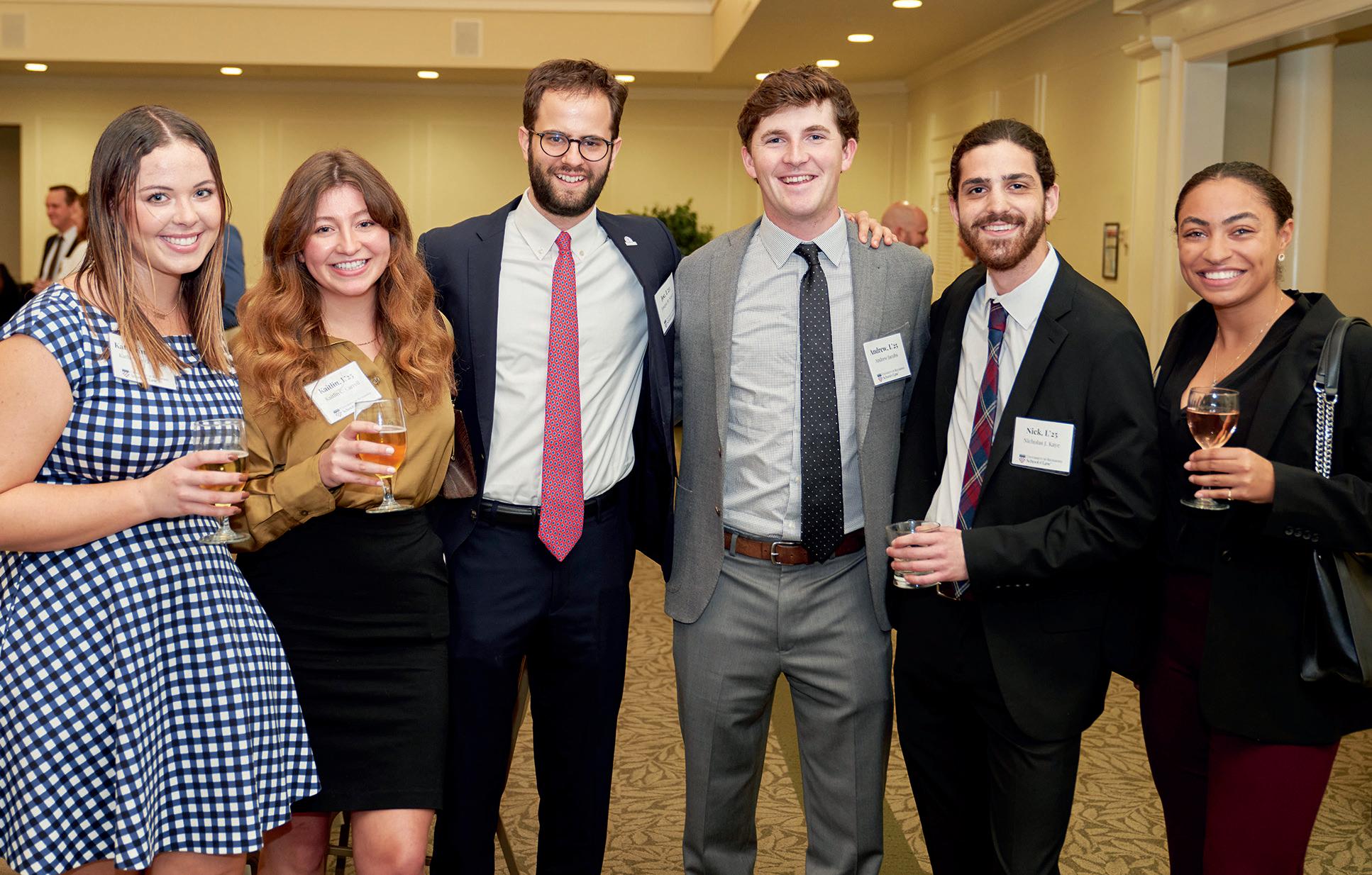

“Some of the staff who work for the city are the same staff who were there when I was a student, and they remembered me,” says Deane. “It was really nice to see this great example of public servants who’ve been staffing the City Council for so long.”
The commission reviews Richmond’s charter, the constitution for the city that provides guidelines for topics such as city government elections and the relative powers of the council and mayor. Commissioners look for possible changes “to improve local government and the services that our city residents receive,” she says. One of Deane’s colleagues, Thad Williamson, is a fellow Spider. He is associate professor of leadership studies at UR and chair of the commission.
In addition to her role on the commission, Deane serves as the chief executive officer of Voices of Virginia’s Children, a nonprofit children’s advocacy organization. In this position, she spends time in the legislative space and General Assembly and works on policy campaigns dedicated to improving children’s lives.
Public service is Deane’s guiding principle in every experience. Some of her clients were children who were not getting the right services to support them in the school environment.
“I realized that these weren’t just individual problems,” she says. “These are systemic problems, and one approach to solving them is public policy and legislation. Practicing law is a privilege, and we have a duty to use those skills for creating a better world.”
—Amy Ogle, ’26The road to her dream job as in-house counsel specializing in intellectual property “was definitely not a straight shot out of law school” for KATHRYN (KATE) DACHILLE, L’13 . She first explored IP as a 1L student at the Syracuse University College of Law. After discovering her interest in trademark and copyright — what Dachille calls “the fun side of the law” — she made the decision to transfer to Richmond Law.

Richmond’s Intellectual Property Institute was one of the primary factors that convinced Dachille to transfer. She pursued the school’s Certificate of Concentration in Intellectual Property (which she obtained with distinction, also earning summa cum laude honors). Following graduation, Dachille charted her professional course, starting her legal career as counsel for a regional bank in the New York City area before securing a oneyear competitive clerkship at NBC. Her next position, as senior legal counsel for PayPal, allowed her to be more hands-on with both IP and marketing matters with the added benefit of moving back home to Maryland.
Those experiences led to her “dream job” today as associate counsel for intellectual property at McCormick & Co., the global spice brand based in Hunt Valley, Maryland. Dachille enjoys an exclusive focus on all aspects of IP within a beloved company from her childhood.
On any given day, she works with inventors on patent and trade secret matters for new flavors, containers, or packaging; copyright and trademark prosecution, licensing, and dispute management; and general marketing matters for clients around the world. Additionally, the opportunity to partner with different business units on problem-solving appeals to Dachille’s sensibility. “It’s a nice way to get that bit of creativity in my day,” she explained.
Plus, there’s an added bonus of the job: free spices.
—Amy Ogle, ’26
The state’s two senators, Mark Warner and Tim Kaine, praised Hanes’ nomination, saying, “Judge Hanes has worked in consumer litigation, as a federal public defender, and with AmeriCorps, where she helped create and operate a nonprofit for abused children and crime victims. These experiences demonstrate her commitment to service and have prepared her for the rigor and responsibility of this role. We are eager to vote for her confirmation.”
MIKE GIORDANO, L’11 , joined the Boeing Co. as senior counsel, supporting the company’s defense, space, and security business.
HARRY L. MAPP JR., L’55 , of South Boston, Virginia, March 18, 2022
FREDERICK J. DEAN III, B’53 AND L’56 , of Virginia Beach, Virginia, March 30, 2022
VIRGIL S. “STEVE” BRADSHAW, B’57 AND L’59 , of New Market, Virginia, March 28, 2022
ROBERT M. HURST, L’60 , of Longboat Key, Florida, April 22, 2022
JAMES A. LUKE, L’61 , of Franklin, Virginia, April 18, 2022
THOMAS W. “WILL” HOTZE JR., L’62 , of Richmond, Virginia, March 22, 2022
THOMAS F. WILLIAMS JR., L’65 , of Fredericksburg, Virginia, Oct. 21, 2021
WALTER S. FELTON JR., R’66 AND L’69 , of Suffolk, Virginia, April 29, 2022
JESS “FRANK” GREENWALT JR., R’64 AND L’70 , of Martinsville, Virginia, May 10, 2022
SPENCER MEAD, L’15 , is an associate attorney at the law firm Harris Lowry Manton in Atlanta. He supports the legal team and develops, handles, and prepares cases for trial.
AMY WHITELAW, L’15 , joined Monge & Associates as a trial attorney, representing injury victims in all forms of negligence claims. Her practice includes Virginia personal injury and will soon expand to other states.
LAWRENCE M. CARDON, L’73 , of Virginia Beach, Virginia, April 18, 2022
GILBERT W. CHICHESTER, L’74 , of Halifax, North Carolina, Feb. 5, 2022
STRAN L. TROUT, R’71 AND L’74 , of Quinton, Virginia, March 11, 2022
JOHN T. “JACK” BRUCE, L’76 , of Richmond, Virginia, Feb. 14, 2022
DONALD E. HINES, L’79 , of Chester, Virginia, Feb. 9, 2022
WALTER F. GREEN IV, L’81 , of Harrisonburg, Virginia, Jan. 24, 2022
SALLIE HUNT MILAM, L’89 , of Charleston, West Virginia, April 19, 2022
EVA LAVONNE STEPHENSON, L’93 , of Verona, Virginia, May 24, 2022
RAUL NOVO, L’96 , of Richmond, Virginia, April 20, 2022
Recognizing that scholarships play a vital role in access to legal education, Dean Wendy Perdue established the Dean’s Opportunity Scholarships fund in 2019 with her own six-figure gift. Since its creation, alumni and friends like you have joined her in leading the way with their own generosity, committing nearly $1.8 million total in gifts and pledges.
Our students graduate with an average debt of $115,000. Scholarships from this fund put a Richmond Law education in reach for students with significant need — and significant potential. Your gift will help further support future lawyers who persevere and demonstrate academic excellence even in the face of adversity. Thank you for being a part of this community.
Support students like Michelle: uronline.net/givetourlaw

“To the donors who made my legal career possible, thank you so much. Financially, I did not even have assurance that I would be able to attend undergraduate school, much less law school. I am proud to be a Spider because of the exceptional community around me that has not only given me an opportunity, but enabled me to maximize that opportunity.”
— Michelle Ugalde, L’25 Dean’s Opportunity Scholar